

Tourism: The Advantages, Disadvantages and How to Properly Travel
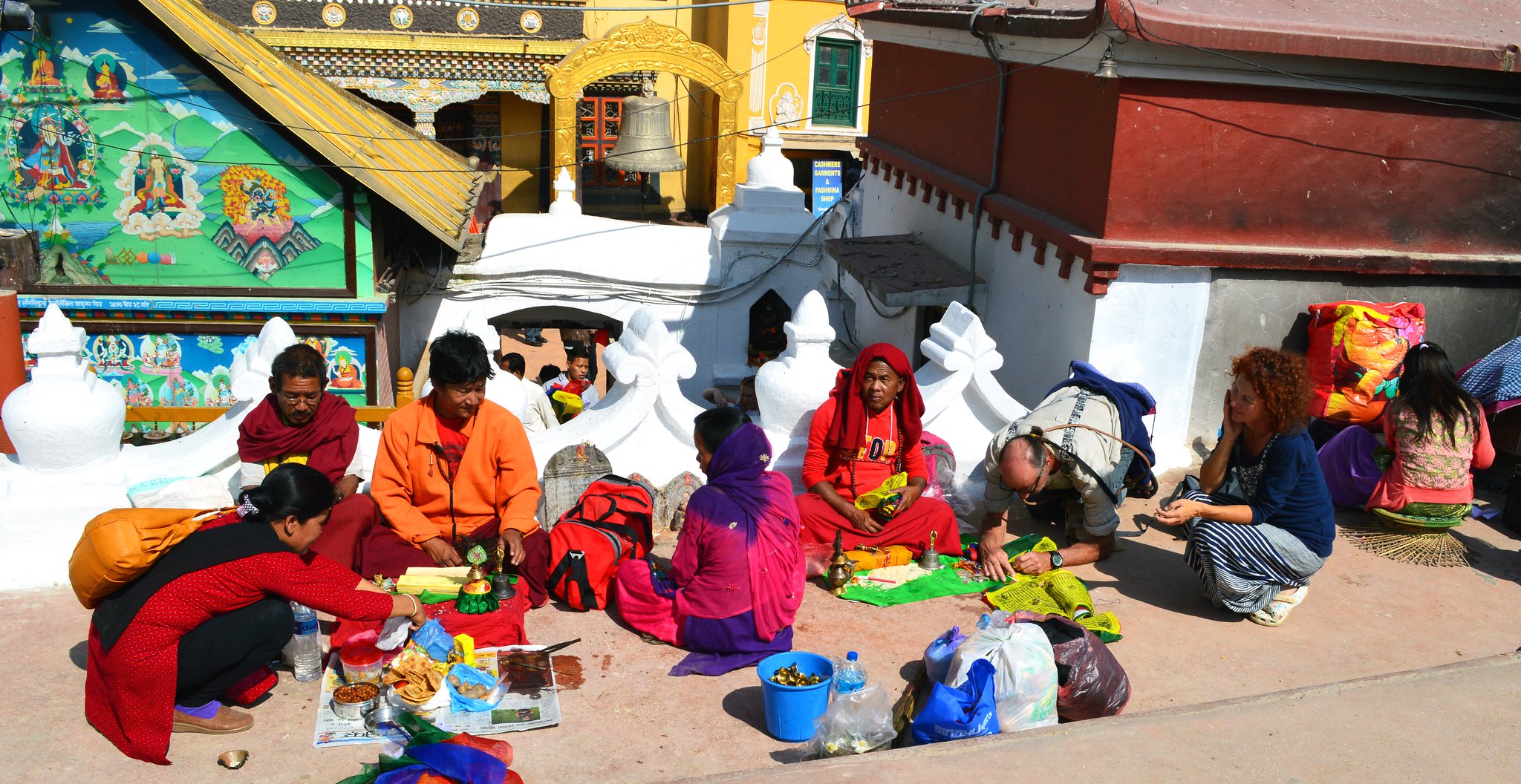
The Advantages
For developing countries, the advantages of tourism tend to be primarily monetary. A large scale tourism industry prevents larger, more harmful businesses from working off the land. Small tourist companies that reign on the land stops large capitalistic corporations from polluting the air or gentrifying people’s homes.
The tourism industry encompasses many different travel areas, which allows the majority of a country’s population to be employed . These employment places include hotels, car rental agencies, restaurants, tour companies, souvenir shops, and equipment shops, among others.
Profit earned from tourism can be reinvested into the country for better infrastructure, education, funding conservation efforts and creating more responsible ways of touring. Without tourism, many countries would not have the same level of access to education and infrastructure. Moreover, tourism allows hosts and visitors to share cultures and meet diverse groups of people. Through respectful interactions, a broader view of the world from both parties can be achieved. By reinvesting the money earned back into the country, tourism and its attractions can grow, creating a positive cycle for the country.
The Disadvantages
With the way the tourism industry is currently run, the disadvantages of tourism may greatly outweigh the advantages in a country. The first factor to take into consideration is environmental damage. When a country has a high tourist attraction, the number of people occupying a space increases immensely. As a result, the release of carbon monoxide gases can increase due to plane and car use affecting the country’s environment. Many countries with ancient ruins or natural attractions are also in danger of destruction or erosion with significant foot traffic and human interaction. Additionally, flora and fauna can decrease in areas or change their growth and migration patterns when there is an overflow of humans interact. Foot traffic and continuous touching can also slowly degrade the stability of ancient structures.
One of the advantages breached upon the sharing of cultures. While this is a great interaction of beliefs and customs, it can become destructive to a host country’s culture. One of the ways cultures can be disrespected is through the commercialization of countries’ cultures . When tourism booms, large industries swoop in and sell figures of the cultures’ icons or traditional wear, disrespecting the countries’ indigenous beliefs and can be harmful to the people living there. Moreover, poor behavior from tourists who don’t respect the spoken or unspoken codes of conduct held by indigenous peoples also undermines the sacred beliefs held within the country.
Also, for many countries, tourism is a seasonal occurrence. For people that work in the tourism industry, their jobs are only viable for a certain number of months, and after the season has ended, many are left without income. Many of these jobs also lack the benefits that other sector jobs supply. Tourism workers are often left without insurance or pension. Not to mention, foreign businesses tend to overtake the companies present in these countries, forcing small businesses to shut down. As a result, foreign businesses keep the majority of profits from tourism, while local businesses lose their income. This hurts small businesses and local economies.
As previously stated, the profit gained from tourism is often reinvested into the industry. However, with unequal infrastructure development, the tourism industry can inadvertently sustain itself without aiding a country’s other vital sectors. As such, many countries end up developing tourism hot spots while the rest of the country suffers. In these countries, there are visible socioeconomic gaps between the wealthy and the poor. Focusing mainly on the tourism industry and places of mass attraction leaves disadvantaged communities at risk of financial instability. Moreover, countries solely invested in tourism are vulnerable to quick economic falls as its working sectors are unevenly balanced. If a natural disaster, political unrest or unprecedented pandemic were to strike, the country would lose a massive income, causing an economic recession that some countries may significantly struggle to bounce back from.
Ways to Respectfully Travel
The most important step to being a respectful tourist is to be an educated tourist. Understanding and respecting the culture and the people of the country is vital. By not undermining tourism countries’ culture and beliefs, the people living there will be more welcoming to tourists, and cultures can flourish without fear of commercialization.
Being environmentally conscious is also important to the survival of these countries. Respecting a country’s land and structures preserve the countries’ beauty and keep the land clean and prepped for further development. Many countries are more environmentally strained, so reducing pollution or your carbon footprint in a foreign country can help ease the strain.
Supporting the small and local businesses found in these countries can help keep local communities employed and support the overall economy. As local businesses grow, more people will have the opportunity to be employed outside of the tourism sector, and the economy will be able to grow within itself.
By learning the advantages and disadvantages of tourism, and how one can improve the practice of traveling, the tourism industry will be able to change for the better and support the countries that host people from all over the world.
– Marlee Ingram Photo: Flickr
“The Borgen Project is an incredible nonprofit organization that is addressing poverty and hunger and working towards ending them.”
-The Huffington Post
Inside the borgen project.
- Board of Directors
Get Smarter
- Global Poverty 101
- Global Poverty… The Good News
- Global Poverty & U.S. Jobs
- Global Poverty and National Security
- Innovative Solutions to Poverty
- Global Poverty & Aid FAQ’s
Ways to Help
- Call Congress
- Email Congress
- 30 Ways to Help
- Volunteer Ops
- Internships
- Courses & Certificates
- The Podcast

21 reasons why tourism is important – the importance of tourism
Tourism is important, more important than most people realise in fact!
The importance of tourism is demonstrated throughout the world. From the economic advantages that tourism brings to host communities to the enjoyment that tourism brings to the tourists themselves, there is no disputing the value of this industry.
The importance of tourism can be viewed from two perspectives: the tourism industry and the tourist. In this article I will explain how both the industry and the tourist benefit from the tourism industry and why it is so important on a global scale.
What is the importance of tourism?
Enhanced quality of life, ability to broaden way of thinking, educational value, ability to ‘escape’, rest and relaxation, enhanced wellbeing, who are tourism industry stakeholders, foreign exchange earnings, contribution to government revenues, employment generation, contribution to local economies, overall economy boost, preserving local culture, strengthening communities, provision of social services, commercialisation of culture and art, revitalisation of culture and art, preservation of heritage, empowering communities, protecting nature, the importance of tourism: political gains, why tourism is important: to conclude, the importance of tourism: further reading.
When many people think about the tourism industry they visualise only the front-line workers- the Holiday Representative, the Waiter, the Diving Instructor. But in reality, the tourism industry stretches much, much further than this.
As demonstrated in the infographic below, tourism is important in many different ways. The tourism industry is closely interconnected with a number of global industries and sectors ranging from trade to ecological conservation.

Why tourism is important to the tourist
When we discuss the importance of tourism it is often somewhat one-sided, taking into consideration predominantly those working in the industry and their connections.
However, the tourist is just as important, as without them there would be no tourism!
Below are just a few examples of the importance of tourism to the tourist:

Taking a holiday can greatly benefit a person’s quality of life. While different people have very different ideas of what makes a good holiday (there are more than 150 types of tourism after all!), a holiday does have the potential to enhance quality of life.
Travel is known to help broaden a person’s way of thinking. Travel introduces you to new experiences, new cultures and new ways of life.
Many people claim thatchy ‘find themselves’ while travelling.
One reason why tourism is important is education.The importance of tourism can be attributed to the educational value that it provides. Travellers and tourists can learn many things while undertaking a tourist experience, from tasting authentic local dishes to learning about the exotic animals that they may encounter.
Tourism provides the opportunity for escapism. Escapism can be good for the mind. It can help you to relax, which in turn often helps you to be more productive in the workplace and in every day life.
This is another way that the importance of tourism is demonstrated.
Rest and relaxation is very important. Taking time out for yourself helps you to be a happier, healthier person.
Having the opportunity for rest and relaxation in turn helps to enhance wellbeing.
Why tourism is important to stakeholders
There are many reasons why tourism is important to the people involved. There are many people who work either directly or indirectly with the tourism industry and who are therefore described as stakeholders. You can read more about tourism stakeholders and why they are important in this post- Stakeholders in tourism: Who are they and why do they matter?

The benefits of tourism are largely related to said stakeholders in some way or another. Below are some examples of how stakeholders benefit from tourism, organised by economic, social, environmental and political gains; demonstrating the importance of tourism.
The importance of tourism: Economic gains
Perhaps the most cited reason in reference to the importance of tourism is its economic value. Tourism can help economies to bring in money in a number of different ways. Below I have provided some examples of the positive economic impacts of tourism .
The importance of tourism is demonstrated through foreign exchange earnings.
Tourism expenditures generate income to the host economy. The money that the country makes from tourism can then be reinvested in the economy. How a destination manages their finances differs around the world; some destinations may spend this money on growing their tourism industry further, some may spend this money on public services such as education or healthcare and some destinations suffer extreme corruption so nobody really knows where the money ends up!
Some currencies are worth more than others and so some countries will target tourists from particular areas. Currencies that are strong are generally the most desirable currencies. This typically includes the British Pound, American, Australian and Singapore Dollar and the Euro .
Tourism is one of the top five export categories for as many as 83% of countries and is a main source of foreign exchange earnings for at least 38% of countries.
The importance of tourism is also demonstrated through the money that is raised and contributed to government revenues. Tourism can help to raise money that it then invested elsewhere by the Government. There are two main ways that this money is accumulated.
Direct contributions are generated by taxes on incomes from tourism employment and tourism businesses and things such as departure taxes.
According to the World Tourism Organisation , the direct contribution of Travel & Tourism to GDP in 2018 was $2,750.7billion (3.2% of GDP). This is forecast to rise by 3.6% to $2,849.2billion in 2019.
Indirect contributions come from goods and services supplied to tourists which are not directly related to the tourism industry.
There is also the income that is generated through induced contributions . This accounts for money spent by the people who are employed in the tourism industry. This might include costs for housing, food, clothing and leisure Activities amongst others. This will all contribute to an increase in economic activity in the area where tourism is being developed.
The importance of tourism can be demonstrated through employment generation.
The rapid expansion of international tourism has led to significant employment creation. From hotel managers to theme park operatives to cleaners, tourism creates many employment opportunities. Tourism supports some 7% of the world’s workers.
There are two types of employment in the tourism industry: direct and indirect.
Direct employment includes jobs that are immediately associated with the tourism industry. This might include hotel staff, restaurant staff or taxi drivers, to name a few.
Indirect employment includes jobs which are not technically based in the tourism industry, but are related to the tourism industry.
It is because of these indirect relationships, that it is very difficult to accurately measure the precise economic value of tourism, and some suggest that the actual economic benefits of tourism may be as high as double that of the recorded figures!
The importance of tourism can be further seen through the contributions to local economies.
All of the money raised, whether through formal or informal means, has the potential to contribute to the local economy.
If sustainable tourism is demonstrated, money will be directed to areas that will benefit the local community most. There may be pro-poor tourism initiatives (tourism which is intended to help the poor) or volunteer tourism projects. The government may reinvest money towards public services and money earned by tourism employees will be spent in the local community. This is known as the multiplier effect.
Tourism boosts the economy exponentially. This is partly because of the aforementioned jobs that tourism creates, but also because of the temporary addition to the consumer population that occurs when someone travels to a new place. Just think: when you travel, you’re spending money. You’re paying to stay in a hotel or hostel in a certain area – then you’re eating in local restaurants, using local public transport, buying souvenirs and ice cream and new flip flops. As a tourist, you are contributing to the global economy every time you book and take a trip.
For some towns, cities and even whole countries, the importance of tourism is greater than for other. In some cases, it is the main source of income. For example, according to the World Travel and Tourism Council, tourism accounts for almost 40% of the Maldives’ total GDP. In comparison, it’s less than 4% in the UK and even lower in the US! In the Seychelles the number is just over 26% while in the British Virgin Islands it is over 35% – so tourism is vastly important in these nations.
The importance of tourism: Social gains
The importance of tourism is not only recognised through economic factors, but there are also many positive social impacts of tourism that play an important part. Below I will outline some of the social gains from tourism.
It is the local culture that the tourists are often coming to visit and this is another way to demonstrate the importance of tourism.
Tourists visit Beijing to learn more about the Chinese Dynasties. Tourists visit Thailand to taste authentic Thai food. Tourists travel to Brazil to go to the Rio Carnival, to mention a few…
Many destinations will make a conserved effort to preserve and protect the local culture. This often contributes to the conservation and sustainable management of natural resources, the protection of local heritage, and a renaissance of indigenous cultures, cultural arts and crafts.
The importance of tourism can also be demonstrated through the strengthening of communities.
Events and festivals of which local residents have been the primary participants and spectators are often rejuvenated and developed in response to tourist interest.
The jobs created by tourism can also be a great boost for the local community. Aside from the economic impacts created by enhanced employment prospects, people with jobs are happier and more social than those without a disposable income.
Local people can also increase their influence on tourism development, as well as improve their job and earnings prospects, through tourism-related professional training and development of business and organisational skills.
The importance of tourism is shown through the provision of social services in the host community.
The tourism industry requires many facilities/ infrastructure to meet the needs of the tourist. This often means that many developments in an area as a result of tourism will be available for use by the locals also.
Local people often gained new roads, new sewage systems, new playgrounds, bus services etc as a result of tourism. This can provide a great boost to their quality of life and is a great example of a positive social impact of tourism.
Tourism can see rise to many commercial business, which can be a positive social impact of tourism. This helps to enhance the community spirit as people tend to have more disposable income as a result.
These businesses may also promote the local cultures and arts. Museums, shows and galleries are fantastic way to showcase the local customs and traditions of a destination. This can help to promote/ preserve local traditions.
Some destinations will encourage local cultures and arts to be revitalised. This may be in the form of museum exhibitions, in the way that restaurants and shops are decorated and in the entertainment on offer, for example.
This may help promote traditions that may have become distant.
Another reason for the importance of tourism is the preservation of heritage. Many tourists will visit the destination especially to see its local heritage. It is for this reason that many destinations will make every effort to preserve its heritage.
This could include putting restrictions in place or limiting tourist numbers, if necessary. This is often an example of careful tourism planning and sustainable tourism management.
Tourism can, if managed well, empower communities. While it is important to consider the authenticity in tourism and take some things with a pinch of salt, know that tourism can empower communities.
Small villages in far off lands are able to profit from selling their handmade goods. This, in turn, puts food on the table. This leads to healthier families and more productivity and a happier population .
The importance of tourism: Environmental gains
Whilst most media coverage involving tourism and the environment tends to be negative, there are some positives that can come from it: demonstrating the importance of tourism once again.
Some people think that tourism is what kills nature. And while this could so easily be true, it is important to note that the tourism industry is and always has been a big voice when it comes to conservation and the protection of animals and nature. Tourism organisations and travel operators often run (and donate to) fundraisers.
As well as this, visitors to certain areas can take part in activities that aim to sustain the local scenery. It’s something a bit different, too! You and your family can go on a beach clean up walk in Spain or do something similar in the UAE . There are a lot of ways in which tourism actually helps the environment, rather than hindering it!
Lastly, there is something to be said for the political gains that can be achieved through tourism.
The tourism industry can yield promising opportunities for international collaborations, partnerships and agreements, for example within the EU. This can have positive political impacts on the host country as well as the countries who choose to work with them.
Tourism is a remarkably important industry. As you can see, the tourism industry does not stand alone- it is closely interrelated with many other parts of society. Not only do entire countries often rely on the importance of tourism, but so do individual members of host communities and tourists.
If you are studying travel and tourism and are interested in learning more about the importance of tourism, I recommend you take a look at the following texts:
- An Introduction to Tourism : a comprehensive and authoritative introduction to all facets of tourism including: the history of tourism; factors influencing the tourism industry; tourism in developing countries; sustainable tourism; forecasting future trends.
- The Business of Tourism Management : an introduction to key aspects of tourism, and to the practice of managing a tourism business.
- Tourism Management: An Introduction : gives its reader a strong understanding of the dimensions of tourism, the industries of which it is comprised, the issues that affect its success, and the management of its impact on destination economies, environments and communities.
What is Tourism and its pros and cons elaborated
Advantages and Disadvantages of Tourism: A Comprehensive Overview
Tourism is a crucial part of the global economy, contributing significantly to job creation , economic growth, and cultural exchange. However, tourism also has its disadvantages, including environmental degradation, cultural erosion, and the potential for exploitation. In this article, we will provide a comprehensive overview of the advantages and disadvantages of tourism.
Advantages of Tourism
- Economic benefits: One of the most significant advantages of tourism is the economic benefits it provides. Tourism generates income for local businesses and creates job opportunities for people in the host community. It also boosts the local economy by increasing the demand for goods and services.
- Cultural exchange: Tourism can be an excellent way for people to experience different cultures and ways of life. It promotes understanding and tolerance between different groups and can help to break down cultural barriers.
- Preservation of heritage sites: Tourism can help to preserve heritage sites by providing the necessary funding and resources for their maintenance and restoration. This, in turn, helps to protect the cultural and historical significance of these sites for future generations.
- Environmental awareness: Tourism can promote environmental awareness by encouraging tourists to adopt sustainable travel practices. This includes reducing their carbon footprint, conserving natural resources, and minimizing waste.
Disadvantages of Tourism
- Environmental degradation: Tourism can have a negative impact on the environment , including increased pollution, depletion of natural resources, and destruction of wildlife habitats.
- Cultural erosion: Tourism can lead to the erosion of traditional cultures and ways of life. This is especially true in areas where tourism is the primary source of income, and local communities are forced to adapt to meet the needs of tourists.
- Exploitation: Tourism can lead to the exploitation of local communities, particularly in developing countries where labor laws are lax, and workers are not protected. This includes low wages, long working hours, and poor working conditions.
- Overcrowding: Tourism can lead to overcrowding, particularly in popular tourist destinations. This can result in traffic congestion, longer wait times, and increased noise levels.
Tourism has its advantages and disadvantages, and it is essential to strike a balance between the two. The benefits of tourism can be significant, but we must also be aware of its potential negative impacts. By adopting sustainable travel practices and promoting responsible tourism, we can ensure that tourism remains a positive force for economic development, cultural exchange, and environmental preservation.
Are you struggling with your paper? Let us handle it - WE ARE EXPERTS!
Get started
Starts at $9 /page
Recent Customer Feedback
See more customer feedback.., how our paper writing service works.
It's very simple!
Complete the order form by providing as much information as possible, and then click the submit button.
Select your preferred writer for the project, or let us assign the best writer for you.
Allocate funds to your wallet. You can release these funds to the writer incrementally, after each section is completed and meets your expected quality.
Download the finished work. Review the paper and request free edits if needed. Optionally, rate the writer and leave a review.
UN Tourism | Bringing the world closer
Tourism – an economic and social phenomenon, share this content.
- Share this article on facebook
- Share this article on twitter
- Share this article on linkedin
Why Tourism?
Over the decades, tourism has experienced continued growth and deepening diversification to become one of the fastest growing economic sectors in the world. Modern tourism is closely linked to development and encompasses a growing number of new destinations. These dynamics have turned tourism into a key driver for socio-economic progress.
Today, the business volume of tourism equals or even surpasses that of oil exports, food products or automobiles. Tourism has become one of the major players in international commerce, and represents at the same time one of the main income sources for many developing countries. This growth goes hand in hand with an increasing diversification and competition among destinations.
International tourist arrivals (overnight visitors) grew 4% in January-March 2019 compared to the same period last year, below the 6% average growth of the past two years.
This global spread of tourism in industrialised and developed states has produced economic and employment benefits in many related sectors - from construction to agriculture or telecommunications.
The contribution of tourism to economic well-being depends on the quality and the revenues of the tourism offer. UN Tourism assists destinations in their sustainable positioning in ever more complex national and international markets. As the UN agency dedicated to tourism, UN Tourism points out that particularly developing countries stand to benefit from sustainable tourism and acts to help make this a reality.
Tourism; Pros and Cons, Facts and Environmental Impact.
- by Ahsen Soomro

Table of Contents Show
1. wealth generation, 2. the progression of a country, 3. creation of jobs, 4. unity among different societies, 5. conservation, 6. improves geographical identity worldwide, 7. damage to the environment by tourists, 8. exploitation of local culture, 9. non-compliance of tourists, 10. lack of job security/seasonal only, 11. confined to service jobs, 12. unequal infrastructure growth, 13. foreign business owners, 14. neglecting of other sectors, 5+ fun facts on tourism, environmental damage, invasive organisms, negative impact on wildlife, loss of natural resources, challenging stereotypes, gaining cultural sensitivity, authentic experience of cultures.
Tourism is the department or an organization that facilitates people to allow them to visit or spend vacations at places they like.
Tourism is one of the most important industries in any country. It is a large contributor to the economy of a country as it can provide revenue throughout the year. Tourism helps in keeping the employment rate of countries stable as several job opportunities are created due to the tourism industry.
Sometimes, tourism can be a major source of foreign income for the country. This is like Maldives where 40% of the economy is generated from the Tourism industry.
This transaction doesn’t only facilitate the vacation or relaxation of tourists visiting these regions, but also helps to provide a better livelihood to everyone involved in the tourism sector.
Developed countries like USA and UK have greatly benefitted from medical tourism. Medical tourism involves people travelling to developed countries to get treatments unavailable in their home country. These are usually people from developing countries with sub-standard health care. You can also call them a medical tourist !
However, even with the great number of benefits of tourism, there are several drawbacks to it. These disadvantages are sometimes ignored by the tourism sector of that country as their sole purpose becomes profit. We must consider all aspects of tourism which include environmental responsibilities, profit and sustainability.
Today, we will look at some of the Pros and Cons of Tourism;
Advantages of Tourism
One of the major advantages of Tourism is a constant flow of cash. It is very important not just for the economy of the country as a whole but for all those working in the tourism sectors.
Commercial and private airlines operating from these countries tend to make a ton of revenue as people from around the world fly to a tourist attraction. Hotels and guest homes in the hospitality industry make a constant income as travelers flood hotel lobbies looking for a place to stay. This makes sure hotels make money throughout the year.
These small sectors, that come under the umbrella of tourism help to generate money for the country throughout the year. This cash flow is even more essential for small, developing, and third world nations as for some of them the tourist sector might be the biggest contributor to their local economy.
As wealth influx starts in the country, it helps the government to procure necessary funds for development and progression of the country. The tourism sector gives security and stability to the economy of the nation, preventing it from tanking in times of crisis.
The government also gets necessary funds to carry out large scale infrastructure projects like restaurants, hotels, casinos and theater which may further improve the tourism sector, providing more places for travelers to stay and more activities to indulge in. This will help to generate further cash influx.
Other than that, this wealth can also be used to improve the infrastructure of the country. This includes building roads, rail roads, better hospitals and education centers for natives as well as the tourists.
Tourism has provided various jobs to people who were previously unemployed. The natives gifted with constant stable jobs have greatly improved their livelihood ( there is a possible catch to this, I’ve explained in the cons ).
These jobs include working in areas such as hotels, restaurants, bars, casinos, theatres, zoos, parks, entertainment facilities, and more. Some of those you might remember from your last trip, especially the travel agent who booked your tickets or the tour operator who ensured that your trip went smooth or the captain of your cruise ship in the Caribbean. They work relentlessly, away from their families, to make sure you enjoy your vacations.
This has also led to the overall reduction of unemployment in the country, thus reducing burden on the government.
Did you know? 1 in 10 jobs are supported by Tourism industry across the world!
The unique feature of tourism is that it helps to create unity among people from different countries, cultures, backgrounds, traditions, and ethnicities who are all visiting to have some fun.
It allows people to learn different histories, traditions, cultures, diets, and lifestyles of the nations they are visiting. This helps to create understanding and oneness among people which can have a long-lasting impact socially.

Cross-cultural connections are developed as the natives interact with the tourists and may lead to further large-scale collaborations as well!
The main star of attraction for tourists visiting a country is its historical sites and landscapes, particularly the landmarks of the country. These landmarks may be in the form of churches, mosques, cathedrals, monuments, buildings, skyscrapers, beaches, amusement parks, and other attractions to say the least.
This means it becomes the government’s utmost priority to conserve these sites, for the tourism industry to be sustainable.
The government carries out regular maintenance of such areas and rules are placed concerned with damaging or vandalism of the property in order to protect these spots. Once these areas become a part of the tourism sector, they are no less than a cash generator for the country.
Tourists often go back home and praise about the vacation that they had. Every person that goes back home brags to at-least 10 more people about the wonderful vacation they had, usually through social media. This allows more people to know more about the country and helps it earn its name and make a place for itself on the map!
Increased recognition leads to further foreign investment and development, followed with increased tourism activity in the area.
Major Cons of Tourism
When it comes to tourism thousands of people may visit, even millions in some spots. This high influx of tourists can lead to immense environmental destruction, especially in destinations where tourists are more prone to visit.
This environmental burden is not solely due to the high influx of tourists, but it is associated with various other factors working together to bring environmental harm.
These factors include increased presence and use of cars, buses, trains, and other vehicles which may raise carbon emissions. A large number of flights at the airport could become a large contributor of air pollution as well.
Tourists can cause a lot of land pollution; as they throw a massive amount of garbage and waste, which is mostly non-biodegradable, leading to a massive number of landfills. All these activities may combine to greatly impact the environment of the region.
Soil erosion, Different kinds of Pollution , habitat loss and destruction as well as forest fires are just some of the environmental effects of tourism.

If these regions are not conserved and taken care of properly, they will lose their natural essence and subsequently be abandoned by tourists. This can lead to permanent damage of the natural tourist attractions!
Fortunately, we have been observing a rise in demand of sustainable tourism. We’ll be discussing that very soon.
Some countries, seeing the vast amount of tourists coming in their country to observe their unorthodox lifestyle and traditions, begin to commercialize their culture. It can be in the form of souvenirs. Usually, the natives are not offended by this.
However, in some regions this can be considered an outright disgrace and mocking of their culture. This is especially true for the regions where locals consider their culture to be their identity. Commercializing may result in people just wearing costumes and exhibiting traditions just to entertain tourists. Observing that the governments are using their culture as a tool for profiteering can cause them to feel sad and ridiculed by their nation.
Sometimes, tourists do not honor cultures and traditions of countries/regions they visit. They may break certain rules and unspoken codes of conduct to which the locals have very high regard. Tourists get drunk in public and do horrendous acts at times. This creates certain hatred among the locals for the incoming tourists.
Racist remarks by tourists and the socioeconomic gap between the tourists and the natives may further exacerbate the issue. The tourists may consider themselves in much higher regard than the natives. Such thoughts may provoke the tourists to act wildly and unlawfully, and sometimes even end up mocking the nation.
Look at it this way; if you go to a friend’s house, you don’t outright break stuff at his home or start shouting remarks to his/her family. You respectfully meet your friend and have a good time, in good spirits. That’s the way you should treat natives when you’re visiting another country, because you’re visiting their home !
Although we did mention that tourism leads to an increase in the employment rate; sometimes these jobs can be seasonal depending on the region and hence, cannot be a dependable income throughout the year. This is more concerning in countries that have specific durations and seasons of high influx of tourists from around the world. These seasonal jobs, hence, offer minimal job security and employees can be left without a proper pension or insurance.
Although tourism generates jobs for locals, most of these jobs are confined to service industry with minimal wages. These low-wage and minimum-skill workers have little ambition to promotion and getting higher up the chain.
Massive income generated from tourism offers countries to build upon infrastructure of the tourist destination only. Sadly, the countries do not use the revenue generated from this infrastructure to build and develop other regions which require maintenance and development.
The wealth generated from tourism is put back into tourism-related things and regions that desperately need improvement are constantly neglected. The locals who don’t live in tourist-economy regions are neglected which leads to imbalance of infrastructure development.
Sometimes most of the places which are heavily infiltrated by tourists are owned by foreign businesses. This means most of the profits and money coming into the country are being used by foreigners thereby causing significant loss of local businesses.
Local industries miss out on the primary source of income that is required for them to stay afloat and to grow. This can lead to businesses going bankrupt and losing, overall damaging the country’s economy.
Countries see that tourist is the major source of income for them, tend to ignore other various sectors upon which they are built. This leads to nations neglecting these sectors, thus causing a loss of income, jobs, and growth amongst these sectors. The country aims to put all of its resources in one basket which is the tourism industry, will leaving all others behind for them to crumble and diminish.
This over-reliance on a specific sector for the stability of the nations can sometimes cause a massive impact, especially during times of war, political instability, or natural disasters as it will be led to the long term closure of the tourism of those countries due to unrest. This can eventually drain the country down as its only resource which is tourism is no longer function, and it didn’t have any other sector nor did they built any other sector in a way for them to become sustainable in times of economic crisis.
- Tourism is responsible for 5% of the Global GDP!
- China stays as the world’s top tourism spender, spending more than 260 Billion Dollars!
- Global tourism industry being the largest industry contributes more than 7.5 trillion dollars in the world economy.
- Almost 10% of world’s jobs are sourced from Tourism Industry.
- Tourists spend the most cash in Dubai. Around 28.5 Billion dollars yearly!
- Osaka in Japan is emerging as the hottest tourist spot in the world.
Negative Environmental Impacts of Tourism
The government may choose to put the wealth generated from tourism into preservation of the environment. However, tourism still goes on to put sufficient burden on the natural resources of our planet and prompts over-consumption of natural resources in regions with already limited resources.
Once tourism becomes unsustainable, the surrounding environment starts to deteriorate. Tourism has a wide impact on the air quality, vegetation, water supply, wildlife, and the natural ecosystems of the region.
Most of the tourist activities have a negative impact on ecosystems. These include fishing, hiking, and snorkeling; all of which tend to affect and deplete the local scenery.
To run a tropical golf course for tourists requires water that can feed up to 60,000 locals. There is a trail in the Himalayas known as “the toilet paper trail” which shows how much damage tourism has caused to the environment.

Once there is an influx of tourists to a common destination, there is an overuse of transportation systems which heavily contributes to pollution (Mainly air pollution). Tourism accounts for 60% of air travel worldwide, and flying one mile in a plane can produce 53 pounds of carbon dioxide.
Even travelers conscious of hurting the environment also cause a negative impact. Tourists that travel to natural sites located remotely, tend to cause damage to natural ecosystems they come to see.
The increased human presence on many geographical regions can alter the number of native plants in the region and introduce non native species in those areas.
Even species brought in as pets into the country are sometime released into the wild and could bring havoc upon the ecosystem if they turned out to be invasive species.

Human intervention and presence can disrupt food webs, ecological communities, and harm keystone species in an area. Others take an active approach and hunt foreign animals as a tourist activity. They can also damage the natural habitat of native wildlife by engaging with it. All of these contribute to wildlife endangerment and extinction.
Tourism can shrink the natural resources by causing over-consumption. This is particularly damaging in areas with food and water scarcity.
This may also lead to hatred among the locals for tourists who use up the limited water supply for luxuries. A natural resource like water could be used to fill up Jacuzzis at a 5-star hotel but could much better be used in feeding a child who suffers from dehydration.
Cultural Benefits of Traveling

When you get to visit another country and observe their culture, you get the opportunity to be exposed to unfamiliar perspectives and traditions and gain a more broad, much informed, and kinder view of the locals and places you encounter.
Perceptions and stereotypes might be replaced by first hand view of the people by the tourists themselves.
People get to see traditions and learn manners of different cultures. Manners and etiquette tourists may not have practiced in their native countries.
Pointing with your index fingers at the indigenous people, showing excessive skin, wearing shoes indoors, and making noises may be considered rude in some places.
So it is important to do a little bit of research on the local customs and traditions before visiting so you can try to avoid being offensive or inappropriate.
It can be a wonderful way to experience the insights of a different culture through the experience of traditions, rituals, festivals, celebrations, and rites. It gives the visitor a chance to understand the cultural heritage of a region much more deeply.
Tourism has its benefits to the economy but the environmental component of tourism shouldn’t be ignored. Think about that the next time you book your tickets. We are also working on reducing your environmental footprint when you travel…Can’t reveal more. Stay tuned!
For now I’d like to leave this picture for you to ponder about Eco-tourism.

Ahsen Soomro
My love for nature is not newfound. I have lived on the countryside for over a decade of my life where I realized how human activities impacted the environment. Later during my stint in medical school, I realized that many of our health concerns originate from neglecting our environmental responsibilities and this was just not sustainable in the long run. Raising awareness, not locally but globally, was the mission. This led to the foundation of EnvironmentBuddy!
Leave a Reply Cancel reply
Your email address will not be published. Required fields are marked *
Differences between Deforestation, Afforestation and Reforestation!
Afforestation; importance, advantages & disadvantages. current efforts, you may also like.

- 5 minute read
Plastic Bag Decomposition Process
- No comments

- 8 minute read
Black Walnuts vs English Walnuts; The Ultimate Showdown!

- 6 minute read
9 Natural Home remedies to get rid of Dust Mites
- One comment

- 10 minute read
Insect House: Purpose, Benefits, Importance, DIY kit

- 11 minute read
Quail Eggs; 12+ Amazing Benefits, Delicious Recipes and how to make them!

How to Avoid Dental Fluorosis on Teeth?
- Net Zero Features
- Conscious Living Essentials
- Geothermal Energy Installers
- Planet Earth
- Climate Policy
- Sustainability

The Pros and Cons of Tourism
We are reader-supported. When you buy through links on our site, we may earn affiliate commission.
The tourism industry is one of the most lucrative and essential industries for the global economy since it can provide revenue almost year-round. It allows people to spend time in places they want to explore and enjoy. Every year, people from all over the world visit destinations like Paris, Hawaii, Mexico and Japan to experience a new culture through food, sightseeing and adventures.
Tourism provides thousands of jobs each year and allows people to explore the world at their leisure. It’s excellent for both the people touring an area themselves for happiness and well-being, and it’s great for the country’s population as a whole.
However, the disadvantages of tourism should be addressed, especially concerning the environment. Tourism industries in some countries often ignore these cons because they want to continue providing revenue for the peoples’ livelihoods. It’s easy to overlook the negative aspects when tourism has brought enormous wealth to developing countries.
If developing nations only rely on tourism and dismiss other aspects, like the environment, society and infrastructure development, the cons can quickly outweigh the pros. Fortunately, there are ways to be sustainable in the tourism industry. Here are the pros and cons of tourism.
The Pros of Tourism
From stimulating job growth to bridging cultural divides, tourism has many benefits for people, the economy and the environment. Below are five advantages of tourism.
1. Creates Jobs
One of the most significant benefits of tourism is creating jobs for people who may have previously been unemployed. Tourism accounts for about 10% of employment worldwide , whether directly or indirectly.
The tourism industry encompasses retailers, restaurant workers, transportation industries, entertainment facilities and hospitality workers. It can even include medical workers as some people travel for cosmetic surgery or medical advice and medications. This leads to the reduction of unemployment in many countries, which reduces the burden on the government.
2. Develops Countries
As more people get jobs in developing countries, they can further progress. The government can get the funds needed to advance their nation. The tourism industry offers more security and financial stability. Plus, the government can carry out various infrastructure projects to continue its progression by building roads, hospitals, hotels, restaurants, and entertainment businesses to allow more people to stay, generating more jobs and wealth.
3. Conserves the Environment
Some of the primary attractions in countries are the historical sights and beautiful landscapes. Often, countries try to conserve these sights and attractions to continue bringing in more tourists. Governments and private entities often use tourism money to maintain historical sight and protect the environment.
4. Broadens Knowledge and Appreciation of Nature
An airboat ride through the Florida Everglades delivers more than the perfect photo opportunity. Airboat captains share stories about the river’s history, wildlife facts, environmental issues plaguing the ecosystem, and how the average person can make a difference. Travel experiences like this are crucial for broadening one’s knowledge and deepening their appreciation for the natural world. The hope is for tourists to impart their knowledge to someone else and spark an interest in conservation and sustainable habits.
5. Encourages Culture-Learning
Finally, tourism encourages the learning of different cultures. It helps to create a sense of unity among people from various cultures and countries. Tourism encourages people of all backgrounds to visit a particular place, so tourist destinations become a melting pot of other cultures. People can begin to understand one another and may even make friends with people from other countries.
The Cons of Tourism
While welcoming visitors to explore a particular area has benefits — especially within the eco-tourism subsector — it’s not all rainbows and sunshine. Unfortunately, there are some cons of tourism that often get overlooked, such as the following.
1. Damages the Environment
Although countries do their best to conserve the environment, including animals, plants and natural scenes, tourists can still be disrespectful. As people flock to one place, waste and pollution accumulate. Sometimes, tours offer animal experiences as well, which put animals through suffering. Further, land is needed to accommodate tourists, so countries will destroy habitats to build hotels and restaurants.
2. Puts Pressure on Natural Resources
Another con of the tourism industry is that it puts an immense amount of pressure on natural resources. Anytime someone stays in an area, they inevitably use the area’s natural resources , like water and food. Cities and countries around the world have faced droughts. Additionally, tourism puts stress on the local land use, leading to soil erosion which can cause damage to infrastructure.
3. Strains Infrastructure
Too many tourists in one location can significantly strain infrastructure, including roadways, water resources and waste disposal. For instance, nearly 30 million tourists visit Venice, Italy, annually, crowding narrow canals and limited roadways. In the Caribbean, Antigua and Barbuda is among the most frequently vacationed and water-stressed countries, with under 1000 cubic meter of freshwater resources per capita. Without a municipal wastewater treatment center, most households rely on poorly built septic tanks.
4. Encourages Dependence on Tourism
It’s not a good thing to be solely dependent on tourism. Regions known for their tourist destinations learned that lesson once COVID-19 spread throughout the world. When people could no longer travel, the tourism industry in countries that depended on it had a more difficult time recovering and getting the necessary resources that locals needed to survive. Without tourists, those countries would receive no more income, which affects the entire country.
5. Leads to Loss of Cultural Identity
Often, locals in a tourist destination will begin copying the lifestyles of tourists and leave their local and cultural traditions behind. Instead of shops filled with daily necessities for the locals, they are filled with things tourists need, like travel-sized toiletries and souvenirs. Fast-food chains have taken over local cuisine as well. And unfortunately, tourism has led to a growth in prostitution and human trafficking.
Making Tourism a More Sustainable Industry
Tourism is a necessary part of the economy, but the adverse effects often go unnoticed. Fortunately, there are ways to make it a more sustainable industry. Tourists should support the local economy, avoid single-use plastics, take more eco-friendly modes of transportation and avoid all of the traditional “tourist” excursions. The next time you travel, make sustainability a priority.
This post was last updated on April 9, 2024 to provide more current information.
Thanks for subscribing! Please check your email for further instructions.
Like what you read? Join other Environment.co readers!
Get the latest updates on our planet by subscribing to the Environment.co newsletter!
About the author

Harvest Hues: 6 Fall Garden Ideas to Elevate Your Yard

10 Top Trends That Are Shaping Sustainability in 2024

Like or Dislike? Social Media and Sustainability’s Influential Relationship

7 Companies Making Waves with Sustainable Investing

Accessible Ideas for Self-Sufficient Living
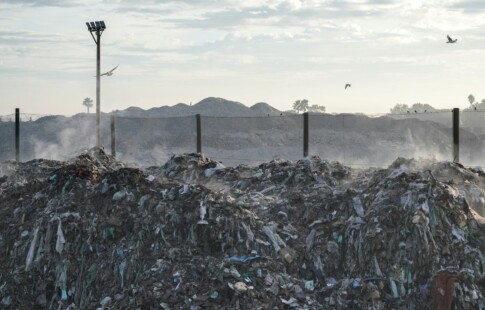
The Impacts of Methane Burning and How to Abate Them

The impact of tourism: How can we all do this better?
John perrottet, beril benli.
Tourism is growing, and growing fast. After surpassing 1 billion international visitors in 2012, we are expecting 1.8 billion by 2030. Tourism is growing faster than the global economy and, for the first time, the statistics for 2015 are expected to show that there were more trips taken to the developing world than to the developed world. But what does this actually mean? Growth, on its own, is not enough. Destinations and their stakeholders are responsible for ensuring that growth is well-managed; that benefits are maximized; and that any negative externalities are minimized. This requires a continuous process of planning and management that evolves and that can be measured over time. For the World Bank Group, our clients and our development partners, this process of planning and management is a central interest. How can we help these processes to deliver more and better development impact? What kinds of interventions or types of assistance will deliver the best results? How do you define the best results – for whom? – and how do we measure them? Being able to demonstrate how the tourism sector contributes to the Bank Group’s twin goals of eliminating extreme poverty and promoting shared prosperity is an imperative for all stakeholders. It’s relevant for national governments, sub-national state agencies, businesses (both multinationals and SMEs), multilateral development banks, NGOs, academics and think tanks. Moreover, it’s vital in helping guide future planning and development, gaining access to and applying for funding, and demonstrating progress to constituents at all levels.
Despite the great breadth and depth of existing impact information, however, serious concerns remain about the accuracy, complexity, gaps, comparability and sustainability of the types of the impact analyses that have been carried out. The Bank Group’s Sustainable Tourism Global Solutions Group recently convened a thought-leadership event in Washington to begin a preliminary discussion about how all stakeholders can come together to try and address some of the current shortcomings. During the “ Measuring for Impact in Touris m” event, we heard about a wide range of challenges for those working in this area and we began to map out the greatest gaps and issues. As Anabel Gonzalez, the Senior Director of the Trade and Competitiveness Global Practice, said at that conference: “We want to be better at monitoring and evaluating our impact, we want to learn from others, and we want to contribute more effectively to tourism development. I believe these are goals most of you will share. We invite you to join this discussion – and be frank, open and provocative.”The findings can be found in our report, “ Towards More Effective Impact Measurement in the Tourism Sector: Observations and Key Issues ,” which highlights a number of priorities. Some of those challenges concern the availability, quality and consistency of data; the high cost of impact measurement for SMEs; the proliferation of different systems; issues of attribution; quantifying notions of “value”; and the ability to communicate effectively to a wide range of audiences. Some key areas for immediate follow-up and further analysis were also identified. They include:
- Exploring the theory of change by examining more closely the proposition that, when tourism growth occurs, those living in extreme poverty benefit and by digging deeper into what tourism growth really means for the poor, especially in terms of employment.
- Assessing the impact value of different types of tourism.
- Assessing and developing the role of technology for data collection, impact measurement and communication.
- Evaluating the use of training for better communication – including assessing what has been tried and what has worked and considering how it could be scaled up.
- Analyzing the necessity and practicality of improving collaboration among various actors, and assessing the alignment of frameworks along with proposals for greater alignment.
- Developing ideas and proposals for the enhanced sharing and pooling of impact data.
- Developing ideas and proposals for greater inclusion of SMEs.
- Competitiveness
- Digital Development
- Urban Development
Get updates from Private Sector Development Blog
Thank you for choosing to be part of the Private Sector Development Blog community!
Your subscription is now active. The latest blog posts and blog-related announcements will be delivered directly to your email inbox. You may unsubscribe at any time.

Senior Industry Specialist

Junior Professional Associate
Join the Conversation
- Share on mail
- comments added

How Tourism Benefits Nature and Wildlife
The Great Barrier Reef. Yellowstone. The Amazon Rainforest. One of the top reasons that tourists are drawn to destinations such as these is because of their rich biodiversity and unique landscapes.
According to Brand USA, 2 of the top 5 motivators for selecting vacation spots are ecotourism and nature. Wanderlusters are seeking experiences that reflect the true essence of the places they are visiting. In other words, they want to visit places with unspoiled environments and thriving native wildlife.
We often hear about all of the ways that humans are destroying wild places and jeopardizing the health of the planet – and rightfully so. Over 75% of land environments have been severely altered by humans and species are facing extinction at up to 1000x the natural rate. While there’s no denying that irresponsible tourism contributes to this devastation, we shouldn’t overlook the important role that sustainable and well-managed tourism plays in advancing conservation and protecting our world’s treasured ecosystems. These benefits have only been further evidenced by the current COVID-19 crisis and the resulting halt in tourism.
In this blog post we’ve highlighted just a handful of the different ways that tourism benefits nature and wildlife. Read on to learn more!
Increasing Community Support for Conservation
Over the last decade, nature-based tourism has become increasingly popular. In total, wildlife tourism now supports nearly 22 million jobs around the world and contributes more than $120 billion to global GDP.
This growing interest in wildlife tourism, and the economic benefits that come along with it, can change community attitudes towards conservation. Without tourism, local communities may merely view wild animals as a danger to their farms and families, and only value natural resources for consumption. But when animals and natural areas bring tourism dollars and jobs to their community, it can help residents see the importance of keeping their natural assets intact and healthy.
In Cambodia, for instance, ecotourism is motivating communities to conserve critically endangered bird species, such as the giant ibis and white-shouldered ibis. Thousands of tourists come from across the world to see these rare and iconic species. The birding operator Sam Veasna Conservation Tours incentivizes community-based conservation in the region by training and employing locals as guides and ecotourism providers, and requiring visitors to donate to village development projects. In return for this income and employment, community members agree to not hunt or cut down trees. To date, Sam Veasna’s visitors have contributed over $500,000 to local communities, making a strong case for the importance of protecting their unique birdlife.
Creating Sustainable Livelihoods
Beyond changing mindsets, tourism can prevent ecosystem degradation by creating more sustainable livelihoods for local communities. Jobs as guides, cooks, or housekeepers offer alternative income sources to environmentally-destructive activities such as logging, slash-and-burn agriculture, quarrying, or illegal hunting.
In Rewa, Guyana, poor job security led villagers to illegally harvest and trade wild animals. As a result, wildlife species such as arapaimas, giant river turtles, and giant otters were beginning to disappear. In 2005, the village opened a community-run eco lodge to improve livelihoods while protecting its ecological diversity. By employing community members as sport fishing guides and boat captains, the lodge allows villagers to maintain rainforest-based livelihoods without causing damage to the ecosystem. Thanks to tourism, arapaimas, turtles, and otters are now common in the Rewa River. Not to mention, visitors contribute far more money to the local economy than wildlife exploitation did. In fact, research shows that globally wildlife tourism is 5x more lucrative than illegal wildlife trade!
Raising Environmental Awareness of Tourists
Tourism not only bears the capacity to shift local mindsets and behavior, it can also raise environmental awareness among tourists. From camping to beach lounging, tourism provides countless opportunities for individuals to learn about the natural world and experience it firsthand.
When people connect with nature during their travels, it can lead them to appreciate it more and become invested in protecting it. Tours, parks, and other travel experiences often facilitate this type of environmental learning through interpretive techniques such as educational brochures, exhibits, or guided excursions. Whale watching, for instance, has been shown to raise visitors’ knowledge of aquatic mammals and increase their support for whale conservation. And on the Great Barrier Reef, guided boat tours and marine biology talks have been found to influence visitor behavior and minimize the damage that they cause to the reef.
In Chilean Patagonia, interpretive panels have been installed along one of the world’s most iconic trekking circuits in Torres del Paine National Park. The panels, which were designed by the Torres del Paine Legacy Fund , educate visitors about the wetland ecosystem they’re traversing, and provide information about the plants and animals found there.
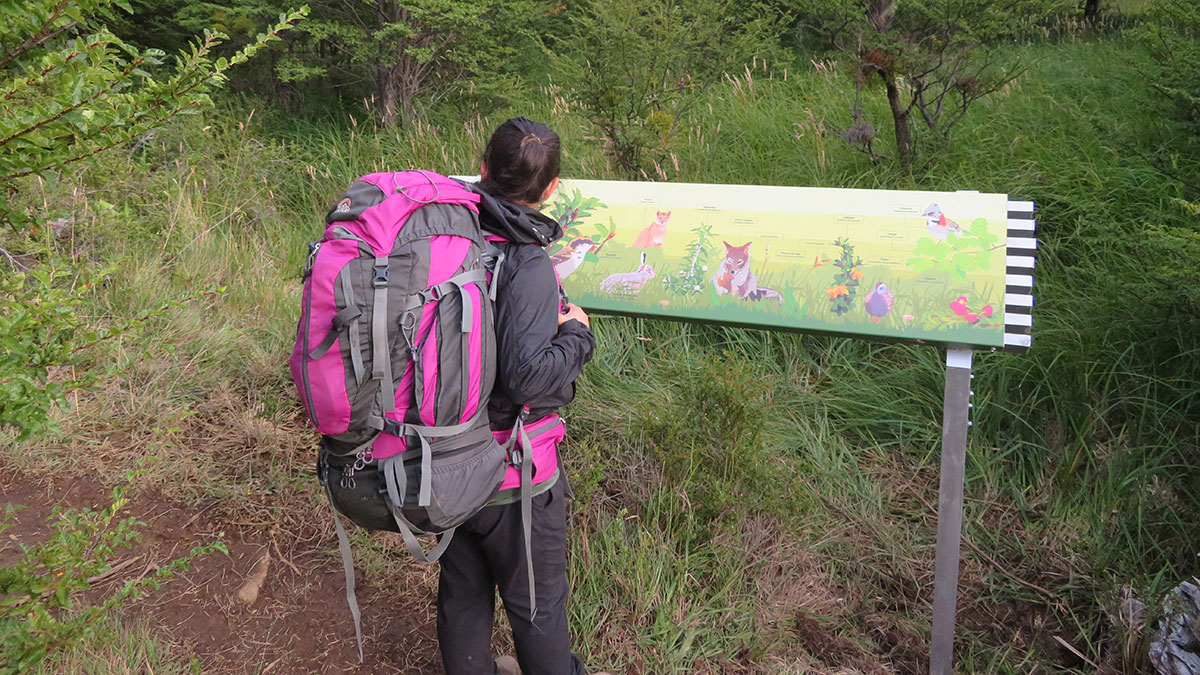
A hiker reads about the types of wildlife that reside in Torres del Paine National Park. Photo: Torres del Paine Legacy Fund.
Prompting Conservation Policies & Protected Areas
Tourism can also provide a compelling incentive for governments and organizations to institute environmental policies and conservation measures. This includes the creation of national parks, nature reserves, and other protected areas to preserve their biodiversity and correspondingly boost their tourism appeal.
Due to the popularity of coastal tourism in particular, reef-based activities such as scuba diving, snorkeling, boat trips and whale watching are a particularly important source of economic revenues. In fact, it is estimated that coral reefs generate $36 billion in global tourism value per year. Many countries rely on the income that comes from marine-based tourism and see the importance of protecting their coastlines, coral reefs, and beaches.
In the Galapagos, for instance, marine-based tourism is worth over $178 million per year, and supports over a third of all jobs. The islands are a hotspot for large and rare marine life, including the highest abundance of sharks on the planet. Thanks to spending by divers and other marine tourists, a single shark in the Galapagos is worth about $5.4 million over its lifetime, while a dead shark only brings in $200 to fishermen. Realizing the economic importance of its life below water, the government introduced no-fishing zones in 2016 to prevent the extraction of sharks and safeguard the island’s marine tourism value.
Mountain gorillas are another species that has benefited from tourism-motivated conservation policies. These endangered apes can only be found in Uganda, Rwanda, and the Democratic Republic of the Congo. In Uganda, gorilla trekking permits start at $600 and the economic value of gorilla tourism is estimated to be as much as $34.3 million . This has led to policies and strategies that support conservation, such as veterinary interventions, intensive law enforcement, community conservation projects, regulated ecotourism, and transboundary collaboration among government institutions and NGOs. Thanks to these efforts, the number of gorillas within the Virunga Mountain region rose from 240 in the 1980s to 604 in 2016 . Now they are the only wild ape population whose numbers are increasing !

Financing Conservation
But simply establishing protected areas isn’t enough on its own. Ensuring the conservation of the sensitive environments and vulnerable species that these areas aim to protect requires effective management and conservation measures.
However, this is easier said than done. Around the world, many protected areas are under-funded. In fact, the global funding gap for effectively managing these sites is estimated to be up to $440 billion dollars per year. Tourism plays an essential role in bridging this gap by providing an additional source of funding. Proceeds from visitor entrance fees, operating permits, accommodations, and guiding services can help pay the salaries of park rangers and guards, and fund necessary management activities such as ecosystem monitoring, anti-poaching patrols, invasive species eradication, and environmental educational programs.
In Africa, tourism is an important source of funding for land and wildlife conservation. SANParks, the public entity responsible for managing South Africa’s national parks, raises more than 80% of its funding from tourism. Chumbe Island Coral Park, a marine protected area off the coast of Zanzibar, takes this model a step further and is funded entirely by ecotourism income. Thanks to effective management, Chumbe Island is home to one of the most pristine coral reefs in the region.
In addition to financing protected areas, tourists and tourism businesses may also contribute directly to local conservation initiatives. In St. Kitts, local tourism businesses donated $18,500 to fund the planting of fruit trees to protect coastal areas. At Vail Resorts, guests are invited to donate $1 when they purchase a season pass, lift ticket, hotel stay, or shuttle ride. In 2019, Vail’s program raised over $975,000 for on-the-ground conservation efforts that help restore habitat, improve forest access, and preserve land.

Carbon offsetting is another way that individuals and businesses can contribute to environmental conservation projects, while also mitigating their own emissions. Luxury tour operator TCS World Travel, for instance, partners with Sustainable Travel International to offset the carbon emissions generated by their jet trips. Through this partnership, TCS supports the Madre de Dios project which protects critical rainforest habitat and endangered species in the Peruvian Amazon.
Aiding Ecosystem Monitoring
While park rangers and guards play a critical role in patrolling sensitive environments, tracking ecosystem health, and warding off threats, it is often impossible for them to monitor such vast areas by themselves. The mere presence of tourists in natural areas can protect wildlife by providing an extra set of eyes on the ground.
In Africa, safari vehicles and guests deter poachers from wildlife conservancies, helping to safeguard highly targeted species such rhinos. The COVID-19 pandemic has further highlighted the critical role that tourism plays in deterring poachers and creating safe havens for wildlife. As visitation has come to a halt, rhino poaching has reportedly increased in tourism hotspots.
The Great Barrier Reef Marine Park Authority’s “Eye on the Reef” program is an even more intentional effort to engage tourists and operators in ecosystem monitoring. The program engages divers and marine tourism providers in watching over the Great Barrier Reef by reporting the coral, fish, pollution, and invasive species they see via a citizen science app. Sustainable Travel International is currently developing NEMO, a similar reef monitoring program for use on the Mesoamerican Reef.
There are countless other citizen science programs that aim to fill different research gaps, and that visitors can participate in during their trip. Whale watchers, for example, can contribute to whale identification and tracking by submitting their photographs of humpback whales via the HappyWhale website. To date, more than 260,000 photos have been submitted to HappyWhale, and more than 38,000 individual whales identified.
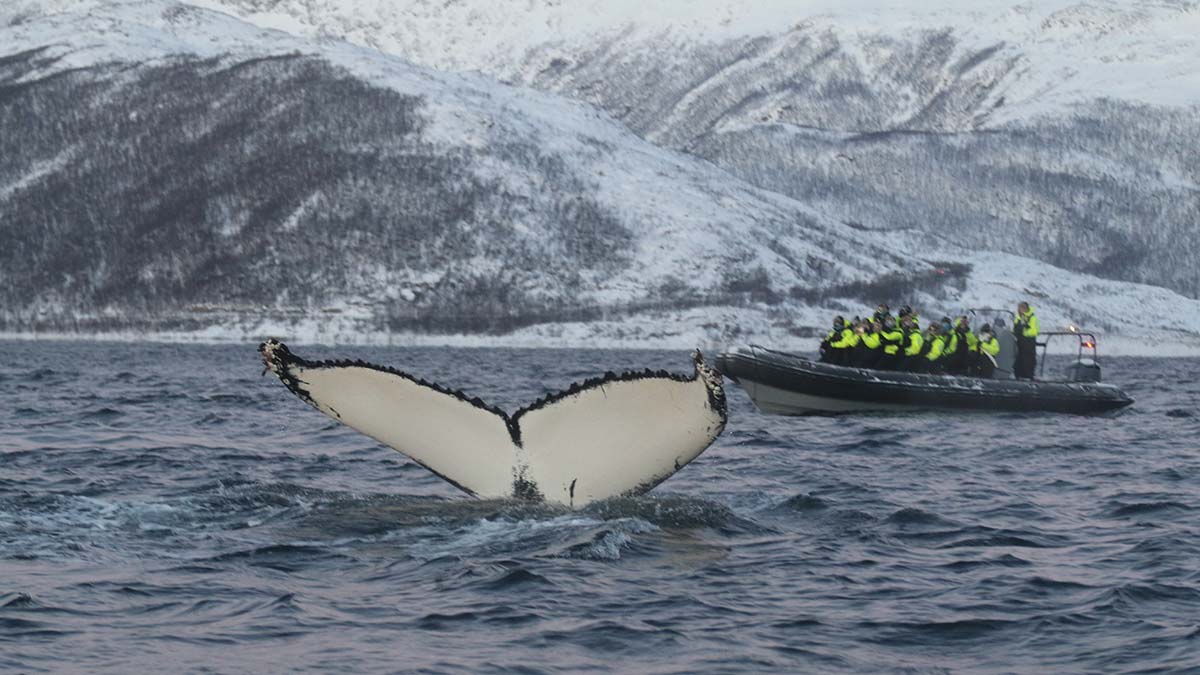
Tourism businesses may also aid researchers in collecting environmental data. In Nevis, the Four Seasons Resort helps researchers study the migration patterns of critically endangered hawksbill sea turtles that nest on the island’s beaches. Resort guests help look for nesting sea turtles which are then fitted with a satellite transmitter and released into the sea. To date, 21 turtles have been released through this program.
Supporting Habitat & Ecosystem Restoration
Along with putting on their scientist cap, visitors and tourism businesses can support conservation by participating in ecosystem restoration.
In Bonaire, local dive operators are lending a hand in restoring the island’s coral reefs by training tourists and divers on basic reef restoration techniques. Once they are trained, visitors can help maintain coral nurseries and outplant coral fragments onto degraded reef sites. To date, more than over 22,000 corals have been outplanted onto Bonaire’s reefs.
Visitors and tourism businesses can also participate in the removal and eradication of non-native species which devastate local habitats. In Mexico, divers and guides lend a hand in hunting invasive lionfish which are a serious threat to the Mesoamerican Reef. After they are captured, the fish are grilled up and served to tourists as a special local dish.

Visitors and tour guides can also help restore ecosystem health by cleaning up the environments they visit. For example, more than 86,000 scuba divers have removed litter from the oceans as part of Project Aware’s “Dive Against Debris” program.
Advancing Green Technologies & Fueling Innovation
Because of its economic importance and influence, tourism can trigger environmental innovation through the advancement of green infrastructure, processes, and technologies. For instance, tourism can lead the way in the development of renewable energy infrastructure, like wind and solar farms, on remote islands or rural areas that would not usually be exposed to clean energy.
In Aruba, tourism is the primary economic activity, representing 73% of GDP. Realizing that the future of its tourism industry depends on environmental sustainability, Aruba’s public and private sector have invested in innovative solutions. Aruba’s Bucuti & Tara Beach Resort, for instance, is considered an eco-pioneer in the Caribbean due to the novel sustainability initiatives that it not only implements, but also develops. Among its achievements, the property heats its water via solar panels, installed exercise equipment that produces electricity, utilizes water saving devices in its bathrooms, and reuses greywater to irrigate its gardens. The resort aids the sustainability transition on the island by offering tours of their grounds and sharing their practices with others.

In Oregon, tourism supported the expansion of electric vehicle infrastructure along the state’s rural roads and scenic highways. The state’s tourism commission, Travel Oregon , helped facilitate the installation of electric vehicle charging stations near tourism businesses and developed Electric Byway itineraries. Now, Oregon is home to one of the largest networks of electric vehicle fast charging stations in the country!
Still Progress To Be Made
But of course, all of the benefits above will only occur when tourism happens in a well-managed and sustainable way. As we’ve gained a better understanding of how humans impact the natural world, there have definitely been great strides towards making tourism more eco-friendly. However, our work is far from done. There’s still a lot of room for improvement by everyone involved in tourism – businesses, governments, communities, and tourists – to maximize tourism’s benefits for the planet.
To learn more about how we are helping to amplify the environmental benefits of tourism and ensure that tourism safeguards local ecosystems through our work, click here .
Free Sustainable Travel Tips List
- June 26, 2020
- Blog , Nature & Wildlife
Recent Posts
Spreading the love: how travel companies can disperse visitors to combat overtourism, climate impact update – 2024 portfolio 4, what is overtourism and why is it a problem, indigenous bunong women weave a brighter future, bird nest guardians in keo seima, reforesting keo seima wildlife sanctuary.
- August 2024
- January 2024
- December 2023
- November 2023
- October 2023
- September 2023
- August 2023
- January 2023
- November 2022
- October 2022
- September 2022
- February 2022
- January 2022
- December 2021
- October 2021
- September 2021
- January 2021
- December 2020
- November 2020
- October 2020
- August 2020
- February 2020
- January 2020
- December 2019
- November 2019
- October 2019
- September 2019
- August 2019
- October 2018
- September 2018
- February 2018
- December 2017
- November 2017
- October 2017
- September 2017
- August 2017
- February 2017
- October 2016
- September 2016
- February 2016
- November 2015
- October 2015
- September 2015
- August 2015
- September 2014
- © 2024 | Sustainable Travel International
- Privacy Policy
Download Our Sustainable Travel Tips List
Subscribe to get your free tips list, plus sustainable travel emails and content
Check your inbox for our Sustainable Travel Tips.

18 Advantages and Disadvantages of Tourism
Tourism is the act of traveling for leisure, recreation, or business purposes. It involves the movement of people to destinations outside their usual environment for a certain period of time.
The purpose of this article is to examine the advantages and disadvantages of tourism, with a focus on its economic, cultural, and social effects.
The article aims to provide a comprehensive overview of the benefits and drawbacks of tourism, and to encourage readers to consider the impact of their travel on local communities and the environment.

- Redaction Team
- February 17, 2023
- Professional Development , Study in Germany
Advantages of Tourism
- Job creation and income generation : Tourism provides jobs in a variety of industries, such as hotels, restaurants, transportation, and entertainment. Tourist attractions, local businesses and historical sites can lead to increased source of income for local residents and a boost to the overall economy.
- Increase in foreign exchange : Tourism can also bring in foreign currency, as tourists typically spend money on goods and services while visiting a destination. This can help to stabilize the economy and lead to growth.
- Development of infrastructure : Tourism can also lead to the infrastructure development, such as roads, airports, and public transportation systems. This can improve the overall hospitality and quality of life for residents and make the destination more attractive to future tourists.
- Exposure to different cultures : Tourism allows people to experience different cultures and ways of life, which can broaden their perspectives and promote understanding and tolerance.
- Preservation of heritage sites : Tourism can also help to preserve tourism-related heritage sites, as the income generated by tourism can be used to fund their maintenance and restoration.
- Cultural exchange : Tourism also provides many countries opportunities for cultural exchange, as tourists and locals interact and share their customs and traditions.
- Promotion of international understanding : Tourism sector can promote international understanding by bringing people from different cultures together and fostering mutual respect and understanding.
- Increase in community involvement : Tourism can also increase community involvement, as residents may become more engaged in efforts to attract tourists and improve their destination.
- Development of tourism industry : Tourism also can lead to the development of the tourism industry, which can create hotels and places to stay, jobs and economic opportunities in a destination.
These are some examples of how tourism accounts can be beneficial and positively impact different aspects of society, however, it’s important to note that not all tourism activities are carried out in a sustainable and responsible way, which can lead to negative consequences.
Advantages of Jasper AI
- Damage to natural habitats and wildlife : Tourism can have a negative impact on the environment, as it can lead to the destruction of natural habitats and the displacement of wildlife. Activities such as excessive hiking, off-roading, and building of tourism infrastructure can generate environmental damage to natural resources.
- Pollution and waste management : Tourism can also lead to an increase in pollution and waste, as large numbers of tourists can generate a significant amount of trash, sewage, and other waste products. This can put a strain on local waste management systems and have negative impacts on the environment and generate natural disasters.
- Overcrowding of popular destinations : Popular tourist destinations can become overcrowded, which can lead to strain on local resources and the degradation of the natural environment. This can also make it difficult for tourists to fully enjoy their experience as they may feel like they are fighting for space with other visitors.
- Disruption of local communities : Tourism can disrupt local communities by altering traditional ways of life, and leading to the displacement of residents. This can cause social and cultural changes that may not be beneficial to everyone in the community.
- Exploitation of local resources and culture : Tourism can also lead to the exploitation of local resources, as well as the commercialization and commodification of local culture. This can lead to the loss of authenticity in tourist destinations and the erosion of traditional ways of life.
- Loss of authenticity in tourist destinations : Some places can become too commercialized and lose their authenticity, being transformed into tourist traps, this can lead to a loss of charm and interest for the tourists, and local residents might feel like they are living in a theme park.
- Dependence on tourism industry : A destination can become too dependent on tourism, and if the tourism industry were to decline, it could have a severe economic impact on the community.
- Widening income gap : Tourism can also lead to a widening income gap, as the benefits of tourism may not be distributed equally among all members of a community. This can lead to an increase in poverty, and social inequality.
- Inflation : Tourism can also lead to inflation, as the demand for goods and services increases, prices may rise, making it more difficult for residents to afford necessities.
Conclusion of Pros and Cons of Tourism
Tourism can bring many benefits to a destination, including economic growth, cultural exchange, and increased community involvement. However, it can also have negative impacts, such as environmental degradation, disruption of local communities, and exploitation of local resources and culture.
To minimize the negative impacts of tourism and to promote sustainable development, it is important to plan and manage tourism marketing activities in a responsible and sustainable way. This includes measures such as setting limits on the number of tourists, protecting natural habitats and wildlife, and involving local communities in tourism planning.
Overall, tourism can be a valuable tool for economic and social development, but it’s important to consider its potential negative consequences and to strive for sustainable tourism practices. This way, tourists, locals, and the environment can all benefit from tourism activities.

Privacy Overview


- Chronicle Conversations
- Article archives
- Issue archives
- Join our mailing list

Tourism Can Help Lead the World to Recovery
About the author, zurab pololikashvili.
Zurab Pololikashvili is Secretary-General of the United Nations World Tourism Organization.
26 September 2020 T he COVID-19 pandemic has hit global tourism harder than any other major economic sector. In an effort to contain the spread of the virus and keep their citizens safe, countries around the world introduced restrictions on international travel, bringing tourism to a standstill almost overnight. Indeed, at the peak of this lockdown, the United Nations World Tourism Organization (UNWTO) found that 100 per cent of global destinations had either closed their borders to tourists completely or introduced strict measures such as compulsory quarantine for new arrivals.
The sudden and unexpected fall in tourist arrivals also placed on hold the many social and economic benefits that tourism delivers. Globally, tourism supports one in ten jobs, and 80 per cent of the sector is made up of small businesses, including family operations. At the start of the crisis, UNWTO set out three possible scenarios for tourism in 2020, depending on when and how widely travel restrictions would be lifted. While it looks like we will avoid the worst-case scenario, we nevertheless expect global tourist arrivals to be down by as much as 70 per cent this year compared to 2019.
The knock-on effect will be significant. The United Nations Conference on Trade and Development (UNCTAD) estimates that tourism’s woes will cause global GDP to decline by as much as 1.5 per cent to 2.8 per cent . Furthermore, the fall in tourist numbers will likely translate into as many as 120 million lost jobs. And, as always, the most vulnerable will suffer the most, including women and youth, for whom tourism is a leading source of opportunity, as well as those working in the informal economy.
Developing countries at greatest risk
No country has been left unscathed by the pandemic, including with regard to tourism. The effects, however, will be most profoundly felt in those destinations that are most reliant on tourism for livelihoods and economic well-being. For the majority of the world’s Small Island Developing States (SIDS), as well as the least developed countries, most notably within Africa, tourism is a lifeline. On average, tourism accounts for 30 per cent of export revenues for SIDS , and in some cases this is much higher. Indeed, in Palau—the newest UNWTO member State, having officially joined in 2019— tourism generates 90 per cent of all exports .
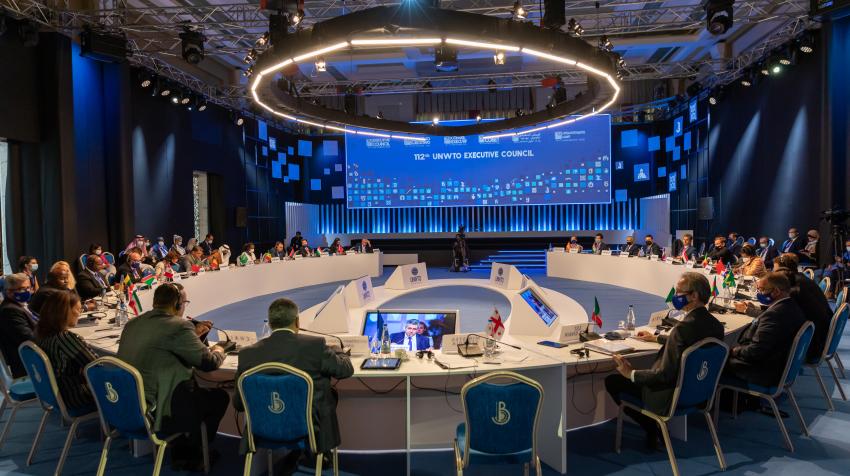
As the United Nations Secretary-General’s Policy Brief on “ COVID-19 and Transforming Tourism ” makes clear, the true cost of the pandemic’s impact on tourism cannot be measured in GDP or employment figures alone. Due to its unique cross-cutting nature, touching upon nearly every part of modern society, tourism is an essential contributor to the wider mission of the United Nations, including achievement of the Sustainable Development Goals. Again, as a leading employer of women, tourism leads the way in the journey towards gender equality. At the same time, tourism is a leading contributor to the promotion and protection of cultural and natural heritage, which is in jeopardy, including the ecosystems and wildlife that draw visitors to developing countries.
Building cooperation and a united response
Before the World Health Organization (WHO) officially declared COVID-19 to be a pandemic, UNWTO recognized both the unique vulnerability of tourism and also the sector’s unique potential to drive wider societal recovery once the health crisis had been tackled. The visit of a UNWTO delegation to WHO headquarters in Geneva laid the foundations for the international, multi-organizational cooperation that has defined tourism’s response to an unprecedented challenge.
This, in turn, came on the back of heightened advocacy for tourism at the very highest political level, most notably at the European Commission at the start of the year, to make sure the sector is at the centre of the planned European New Green Deal, as well as at the most recent meetings of the G20 nations. This has allowed UNWTO to become an increasingly prominent voice within the United Nations. When the crisis hit, we were able to make sure that tourism was part of the conversation at both the governmental and United Nations levels.
The Global Tourism Crisis Committee, convened virtually in March and then meeting five times as the crisis evolved, brought together leading voices from member States and from the private sector. Only UNWTO was in a position to unite such a diverse sector. This Crisis Committee channelled these diverse voices and concerns into a clear plan of action, the UNWTO Recommendations for Recovery . These Recommendations have been embraced across the public and private sectors and now inform recovery plans in every global region.

Sustainability takes centre stage
Central to the Recommendations is the principle that sustainability and inclusivity are at the heart of both the recovery process and the tourism sector that emerges out of this crisis. The pause in global tourism presents the global community with a chance to reassess its priorities. It also allows us to put the principles that are central to the work of UNWTO—namely that tourism works for people and planet, and should be open to all and benefit all—front and centre of everything we do.
The number one priority, however, is to build trust and confidence. Only by making people feel safe and encouraging them to travel again will the benefits that tourism offers start to return. UNWTO, as the specialized United Nations agency for tourism, must lead by example. To this end, as soon as it was safely possible, in-person visits to member States resumed: to the Canary Islands and Ibiza in Spain, to Italy, and to Saudi Arabia. The decision was also made to hold a hybrid Executive Council meeting, the first in-person meeting of the tourism sector and the United Nations to be held since the start of the pandemic. This brought together 170 delegates from 24 countries, sending a clear message that safe international travel is now possible in many parts of the world, thus providing a vital confidence boost for the sector.
As tourism restarts in many parts of the world, with growing numbers of countries easing travel restrictions, the sector’s position within the work of the United Nations has never been more relevant. UNWTO leads the restart guided by the principles of the Tbilisi Declaration , signed by our member States in Georgia at the close of the UNWTO Executive Council (15–17 September 2020). The Declaration recognizes the importance of tourism to livelihoods, to economic prosperity and opportunity, and to preserving our shared and unique culture. Signatories also committed to building back better, prioritizing sustainability and equality, and ensuring that, as tourism builds a brighter future, nobody is left behind.
The UN Chronicle is not an official record. It is privileged to host senior United Nations officials as well as distinguished contributors from outside the United Nations system whose views are not necessarily those of the United Nations. Similarly, the boundaries and names shown, and the designations used, in maps or articles do not necessarily imply endorsement or acceptance by the United Nations.

Voices for Peace: The Crucial Role of Victims of Terrorism as Peace Advocates and Educators
In the face of unimaginable pain and trauma, victims and survivors of terrorism emerge as strong advocates for community resilience, solidarity and peaceful coexistence.

Sailors for Sustainability: Sailing the Globe to Document Proven Solutions for Sustainable Living
Most of the solutions we have described are tangible examples of sustainability in action. Yet our sailing journey also made us realize that the most important ingredient for a sustainable future is sustainability from within. By that we mean adopting a different way of perceiving the Earth and our role in it.

What if We Could Put an End to Loss of Precious Lives on the Roads?
Road safety is neither confined to public health nor is it restricted to urban planning. It is a core 2030 Agenda matter. Reaching the objective of preventing at least 50 per cent of road traffic deaths and injuries by 2030 would be a significant contribution to every SDG and SDG transition.
Documents and publications
- Yearbook of the United Nations
- Basic Facts About the United Nations
- Journal of the United Nations
- Meetings Coverage and Press Releases
- United Nations Official Document System (ODS)
- Africa Renewal
Libraries and Archives
- Dag Hammarskjöld Library
- UN Audiovisual Library
- UN Archives and Records Management
- Audiovisual Library of International Law
- UN iLibrary
News and media
- UN News Centre
- UN Chronicle on Twitter
- UN Chronicle on Facebook
The UN at Work
- 17 Goals to Transform Our World
- Official observances
- United Nations Academic Impact (UNAI)
- Protecting Human Rights
- Maintaining International Peace and Security
- The Office of the Secretary-General’s Envoy on Youth
- United Nations Careers
- Search Please fill out this field.
- Newsletters

7 Personal Benefits of Travel
:max_bytes(150000):strip_icc():format(webp)/greg-rodgers-adventure-ed92646b25f247049e53af6d36f6c15f.jpg)
Forget milling around in your finest evening wear, Singapore Sling in hand: You'll be lucky to get peanuts. Flying isn't quite the party it was in Sinatra's days, and lots of time, energy, and money are expended to leave home, so why travel? How long do the personal benefits of travel last?
Getting away from home and stepping outside of your usual routine is beneficial for both mind and body. The long-lasting personal benefits of visiting a foreign country far outweigh the costs and time to get there.
The great travel writer Pico Lyer said: "Travel is not really about leaving our homes, but leaving our habits." Here are seven ways that travel, especially international travel, will enhance your life.
Travel Sharpens the Mind
You've done your old routine for so many years that you could run through it on autopilot. Being dropped into a new environment engages a dormant part of your mind and gets those synapses firing again.
Suddenly, you'll be required to navigate unfamiliar places, read foreign languages , try new things, make quick decisions, and choose your new eating and sleeping schedule.
Unlike at home, all the new sights, sounds, and places will require mental processing and filing. Your brain will welcome the workout! Once you return home, you'll be sharper than ever for better organizing and sprucing up your daily routine.
A Shift in Perspective
"Nobody comes back from a journey the way they started it." — Unknown
Being exposed to new cultures and people will greatly shift your paradigm and create a healthier perspective once you return back home. Seeing different social classes creates compassion and really makes you feel more blessed and content. Large portions of the world's population have to deal with daily threats such as hunger, disease , and landmines .
A hard day at work suddenly doesn't seem so bad when you see people in developing countries toiling in sun-scorched fields from morning to dark, or begging for a drink of water.
A Chance to Try New Things
"Do not follow where the path may lead. Go instead where there is no path and leave a trail." — Ralph Waldo Emerson
While you may branch out at home from time to time by trying new restaurants or splurging on expenditures, traveling kicks you out of the comfort zone and forces you, for better or worse, to try new things!
Even if you don't enjoy your first attempt at scuba diving , at least you'll be able to relate in a new way the next time you see it in a movie or hear someone talking about it.
Becoming a well-rounded individual enhances self-confidence and will help you find new material for conversation in social settings with a wider variety of people.
Who knows, you may accidentally discover your new favorite food or find out that you want to pursue a new career in karaoke!
Meet New People
"A journey is best measured in friends, not in miles." — Tim Cahill
You'll meet far more friendly people on the road than you will under ordinary circumstances at home.
Other travelers are always looking to share experiences, give tips on places to go, and meet people from all over. Striking up a conversation with other travelers is extraordinarily easy.
A polite "so where are you from?" breaks the ice quite easily and may lead to lasting friendships with people from all over the world.
See the Real Deal
"To travel is to discover that everyone is wrong about other countries." — Aldous Huxley
Until you visit a place and form your own opinions, your understanding only comes from what you were taught in school, read in books, or saw on media, which may or may not be a complete truth.
Don't over-research your upcoming destination in guidebooks. Do your best to avoid building a bias toward a place or installing mental filters before you visit. Wait to form your own opinion, remaining objective until you can make up your own mind.
Exercise and Sunshine
Sure, you could just go sweat in the gym under fluorescent lighting, but chances are that you'll be much more active from day to day while on the road, regardless of whether your trip is an adventurous one or simply a relaxing beach trip .
You could be exploring new cities on foot, hiking , swimming, walking between places, and hopefully soaking up some needed sunshine while doing so. And it's guaranteed to smell better than the gym.
Come Home Renewed
After stepping away from home for a while, you'll return with renewed energy, a new set of mental filters, and ready to take on the next big project or challenge. Call it a life reboot.
Getting away for some time, even though it requires effort, will greatly enhance your attitude and productivity once you return home. Sure, you may have some mail piled up and matters to attend, but those are simple challenges easily knocked out.
Breaking up the monotony for a while is a great way to reduce stress and give your life an injection of excitement. Don't be surprised if shortly after your return, you're already counting down days until the next trip!
Related Articles
More related articles.

- Business Guide
- Destination Guide
- Hotel Guide
- Places to visit
- Things to do
Tourism Planning: Importance, Benefits, Types & Levels
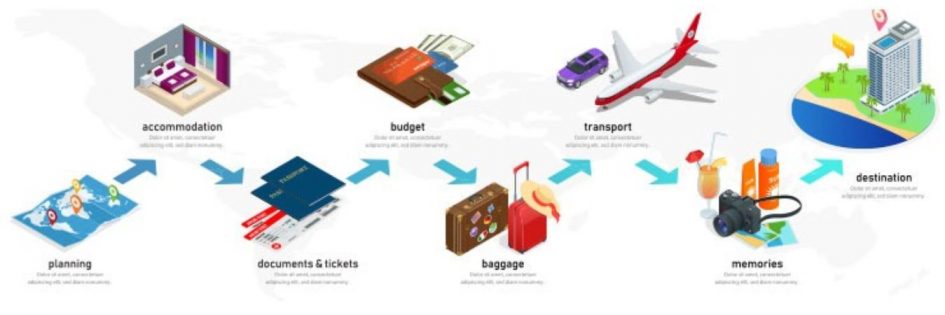
Planning is to prepare a Road Map to achieve goals.
In 1987 D.Getz defined tourism planning as “a process, based on research and evaluation, which seeks to optimize the potential contribution of tourism to human welfare and environmental quality”.
Faludi, in 1973, defined tourism planning as “Planning is a very important part of the process by which governments manage tourism at the national, local and organizational levels”.
What is Tourism Planning?

The upkeep and expansion of the tourism sector in a particular area is referred to as tourism planning. Planning for tourism is, of course, a crucial component.
Creating strategies and plans to increase, develop, and stimulate tourism for/in a destination may be summed up as tourism planning. The primary motivation behind establishing and implementing strategies for the tourist industry is to generate money, which will eventually raise the GDP of a nation or region.
What is the need for Tourism Planning?

For the expansion of the sector important to plan tourism activities for the following reasons:
- It is necessary to plan tourism activities on different levels and in various manners to promote tourism and boost the economy.
- To provide quality to both tourists and residents.
- It involves making major decisions which cannot be taken spontaneously.
What are the components of Tourism Planning

- Exploration phase/ Preparatory
- Planning phase/Feasibility/
- Zoning phase/Formal planning
- Design and implementation phase
- Operational phase
Most nations that have successfully planned their tourism can be found online and are regarded as incredible holiday destinations. People go to these nations hoping their travel vlogs will increase their subscriber count on YouTube. That is an indication of success in the modern day.
Benefits of Tourism Planning

Tourism destination planning should be a vital component of every destination’s tourism development plan to get the best outcomes and please all stakeholders. While some places do a great job of maintaining sustainable tourism, others (typically developing countries) need to recognize the significance of comprehensive tourism development planning.
Tourism planning can benefit various parties involved from the industry in the following ways:
- It boosts revenue and employment thanks to tourist spending.
- It safeguards cultural and natural assets so that visitors can enjoy them.
- It broadens the comprehension of cultural diversity
- It constructs new infrastructure, such as sewage systems, roads, etc., for the community.
Impacts of Tourism Planning
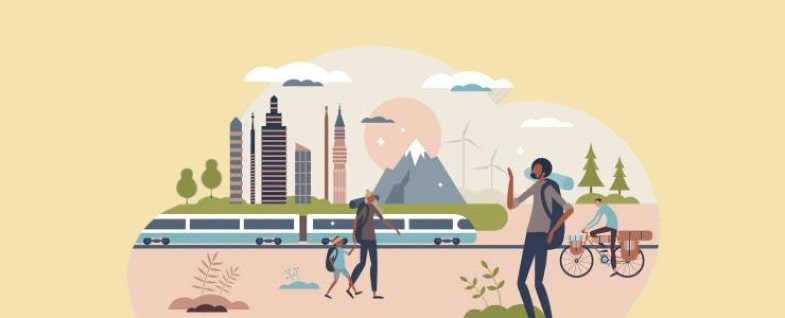
The impacts of tourism destination planning can be sorted into seven general categories:
- Environmental
- Social and cultural
- Crowding and congestion
- Community attitude
Formulating an approach to tourism policy and planning:
According to Inskeep, six “golden standards” should be followed when creating a strategy for tourist planning and policy (1991).
1. Goal Oriented:
Tourism Planning should be oriented to achieve broad national and community goals.
2. Integrative:
Integrating tourist policy and planning into the economy, land use and infrastructure, conservation, and environmental planning.
3. Market Driven:
Planning for successful tourism growth in a cutthroat international market.
4. Resource Driven:
Developing tourism that capitalizes on the location’s inherent advantages while preserving and improving the features and experiences of existing tourism resources.
5. Consultative:
Considering broader community attitudes, needs, and desires to determine what the population will accept.
6. Systematic:
utilizing primary or secondary information to support planners conceptually or predictably, incorporating knowledge from other tourist locations
Levels of Tourism Planning

Planning and policy for the tourism industry occur at several levels. This can be done in a top-down approach, with international or national bodies, or a bottom-up approach from a local level.
1. International Tourism Planning:
Tourism planning at the international level typically involves international transportation services, the movement and scheduling of tourist tours between different countries, the development of significant tourist attractions and facilities in neighboring countries, as well as the working strategies and promotional programs of many nations.
2. National Tourism Planning:
Tourism policy, infrastructural facilities, and a physical structure plan, which includes significant tourist attractions, chosen tourism development regions, international entrance points, facilities, and services, are all addressed at the national level of tourism planning. Additionally, it is concerned with the quantity, types, and quality of lodging and other essential tourist facilities and services; the country’s major travel routes and their regional connections; tourism organization
rights, laws, and investment policies; marketing and promotion strategies for the industry; education and training initiatives; and environmental, economic, and sociocultural analysis.
3. Regional Tourism Planning:
Regional planning considers factors such as regional policy, regional entrance points, transportation facilities, and services; the types and locations of tourism attractions; the quantity, varieties, and places of lodging and other tourist facilities and services; and the sites of tourist development regions, such as resort areas.
They will also oversee sociocultural, environmental, economic, and impact analyses, regional education and training programmes, marketing strategies, investment policies, organizational structures, legal frameworks, and implementation strategies, including project plans and zoning ordinances.
4. Local Tourism Planning:
Participants at the local level will think about the analyses, outputs, outcomes, and assessment of tourism planning at the ground level.
Types of Tourism Planning

Before creating a comprehensive plan to market the destination, the following types of tourism planning are taken into account:
Spatial Tourism Planning:
Spatial tourism planning attempts to thoroughly process social, environmental, and economic change to bring about certain ends. Drawing plans, maps or diagrams are put together to decide where socio-spatial activities can occur.
Sectoral Tourism Planning:
In this kind of planning, the regions are divided into sections, and each section is called a sector. It concentrates on a manageable area and takes into account the specific infrastructure, land use, transportation, and environmental requirements of that region. Depending on the nature of the products or services provided, economic, social, and administrative activities are grouped into sectors.
Complex Tourism Planning:
When various regions are considered for the purpose of tourism planning, it is known as complex tourism planning. These regions are to be developed comprehensively because of the significant interest shown by international tourists. There is a possibility that these regions are located far away from one another.
Integrated Tourism Planning:
Integrated tourism refers to making tourism the primary industry in a given area by systematically and comprehensively promoting all available economic, social, and tourism resources.
Sustainable Tourism Planning:
Sustainable tourism planning involves striking the correct balance between the requirements of people and the environment. It entails stating the community’s mission, vision, and unique selling point or identity in clear terms. With the help of this type of destination planning in our local communities, we are better equipped to plan for the long term, and respond to changing target markets, trends, and emergencies like the Covid-19 outbreak. Additionally, it guarantees that resources are allocated properly while ethically and sustainably establishing local communities. This method of tourism planning benefits people and places in positive ways on all fronts—socially, economically, culturally, and environmentally—puts sustainability at its core.
Centralized Tourism Planning:
Centralized tourism planning is done by a single authority, usually the state or central government.
Decentralized Tourism Planning:
Organizations are interested in developing tourist spots and planning the various activities visitors can enjoy. (Joint Venture).
They take assistance from government. Suggested Read: Sustainable Tourism
Frequently Asked Questions
Why is tourism planning important.
Destination development plans should include tourism planning since it promotes a destination’s long-term viability and encourages cooperation among important stakeholders..
What are the features of tourism planning?
Three general principles of planning for tourism can be specified as anticipation, regulation and monitoring.
What are the barriers to tourism planning?
According to earlier research conducted in several nations, a common pattern of issues has emerged. For instance, financial constraints, a lack of knowledge, an insufficient amount of time, and other issues have prevented local governments from incorporating tourism into their development plans.
Subscribe for Latest Updates
Check your inbox or spam folder to confirm your subscription.
My passion as a guitar maker comes from a life-long obsession with making things. From a young age I have always tried to manipulate objects and materials in order to create something entirely different. I find that working with wood is a way for me to connect with nature. The simple act of shaping wood to make something functional or beautiful brings me endless satisfaction.
Leave a Reply Cancel reply
Your email address will not be published. Required fields are marked *
Save my name and email in this browser for the next time I comment.
Talk To Us!
Latest posts.
- Top-Notch Luxury Activities in Thailand: Experiencing the Unusual
- Experience Fun Splash at Yas Waterpark in Abu Dhabi
- Useful Tips to Promote a Travel Agency & Get Effective Results
- Unmissable Attractions: Discover Top 10 Places to Visit in Almaty
- List of Best Things to Do in Ethiopia for Ultimate Adventure

Unpacking the Pros and Cons of Tourism
Last Updated on October 5, 2023
As travelers, it’s easy to see the benefits of travel on an individual level. Travel is relaxing, exciting, and gives us a chance to escape the routines of our daily lives. But there pros and cons of tourism.
While travel is experienced individually, it does have a big impact beyond the individual traveler. Travel is only possible because of the people who work in tourism, support tourism, and the communities that call “destinations” home.
Unfortunately, the impacts of tourism aren’t all good. While there are plenty of benefits, there are downsides as well. Let’s unpack the pros and cons of tourism.
1. Helps Preserve Culture and Heritage
2. stimulates economic growth, 3. positive social effects of tourism, 4. supports environmental conservation, 5. encourages global awareness and learning, 1. overtourism, or mass tourism, 2. impacts on wildlife, 3. commodification of culture, 4. environmental damage, 5. encourages dependence on tourism, weighing the good and bad of tourism, how to keep the impact of tourism positive, final thoughts: the pros vs. cons of tourism, what are the pros of tourism.
Read on for 5 of the key pros, or benefits, of tourism.
One major benefit of tourism is that it can help preserve culture and heritage through cultural promotion and preservation.
Much of travel is centered around experiencing other cultures, whether it’s through formal experiences like visiting cultural sites, or informal experiences like simply dining in a local restaurant.
Both types of experiences lead to increased cultural awareness. Visitors learn about a culture different from their own, which leads to better understanding.
Tourism also helps preserve culture and heritage through the accumulation of resources that can be put toward cultural preservation. For example, purchasing a ticket to visit a heritage site will typically support the operation of that site.
Essentially, tourism provides visitors experiences that lead to cultural understanding, as well as more funding for cultural sites.

One of the biggest pros of tourism is economic. Tourism accounts for about 10% of employment worldwide , both directly and indirectly. Benefits can extend to a local economy, and broader, country-wide economy as well.
While there are the obvious jobs that tourism creates, like tour operators and hotel staff, there are also tourism adjacent jobs. The restaurant, retail, transportation, and entertainment industries all benefit from the presence of tourists. Local businesses selling all sorts of goods can benefit as well.
In countries where employment rates are low, tourism can add valuable jobs, and contribute to economic growth. For example, tourism represents about 38% of the Maldives’ GDP .
When tourism helps to improve the economy of a country, there’s the opportunity for that growth to benefit the people of that country. A stronger economy can lead to positive social effects that impact everyday life.
Tourism also creates incentives for investments that can have positive social effects. For example, tourism encourages infrastructure such as roads, transport networks, medical facilities, and education facilities. While the main goal may be to support visitors, this investment in infrastructure often benefits local communities just as much.
Some of the primary attractions in countries are the historical sights and beautiful landscapes. When sites start to gain attention from tourism, there’s more incentive, and money, to invest in protecting those places.
Tourism demand can lead to the creation of protected areas, national parks, and designated heritage sites. This in turn often results in more funding and regular maintenance.

Another pro of tourism is that it encourages travelers to learn about cultures outside of their own. Often, this learning helps to create a sense of unity among people from various cultures and countries.
Exposure to other cultures makes it possible for people to understand one another’s cultural practices, beliefs, and traditions. This in turn leads to global awareness and cross-cultural understanding.
What are the Cons of Tourism?
While there are plenty of pros of tourism, there are cons of tourism as well. Read on to learn about the negative impact that tourism can cause.
Overtourism , also known as mass tourism, is one con of tourism that can’t be ignored. Overtourism is when too many tourists visit a particular destination. It describes the many side effects that mass tourism can create.
When tourism becomes unsustainable in a destination, you start to see negative consequences. These consequences can impact local life, culture, the land, animals, and more.
For example, this has been seen in India, where the impact that tourism has had on the country’s Bengal tiger population is debated . The population of tigers is

Travel, and particularly overtourism, can lead to exploitative wildlife tourism by creating a demand for animal encounters. Tourists travel to places hoping to see beautiful animals, but this can put animals, particularly endangered ones, at risk.
When there’s demand to see or visit with an animal, that animal is at greater risk to be brought into captivity. A tourism industry around interacting with that animal means that animal no longer gets to be wild.
The commodification of culture is a con of tourism that’s closely related to manufactured authenticity. Commodification often contributes to making a cultural experience feel less authentic. This is usually because that cultural experience or practice is being performed in a tourist setting.
Commodification also points to how an aspect of culture can be made into an experience that is sold. While this isn’t always bad, there’s always the risk that the actual meaning of a cultural practice becomes lost because of this inauthenticity.
Natural areas can suffer when tourism becomes prevalent. With more people visiting a forest, park, or beach, there’s more opportunity for ecological damage. Typically more people leads to more litter and pollution, and animal habitats can end up disrupted.
Tourism often puts pressure on natural resources through over-consumption, often in places where resources are already scarce. Tourism puts enormous stress on local land use, and can lead to soil erosion, increased pollution, natural habitat loss, and more pressure on endangered species.
A final con of tourism is that it can lead communities, and even countries, to depend on tourism. While tourism can contribute strongly to the economy of a destination, there’s the risk that that dependence will backfire.
For example, when the pandemic began in 2020, many destinations felt the loss of tourism dollars. Iceland ’s tourism sector is one of the country’s most dependable sources of economic growth, and the industry provides many jobs for locals.
When pandemic restrictions led to a rapid drop in visitors , Icelanders lost their job security, and many lost their incomes.
Tourism is all about balance. While there are pros and cons of tourism, it is possible to create a responsible and sustainable tourism model that leads to positive effects for local communities.
One thing that’s important to remember is that the cons of tourism are largely systemic. They aren’t the fault of small businesses, or individual travelers. These are issues that need to be addressed by government policy, tourism boards, and corporate entities.
As travelers, one of the best ways to keep the impact of tourism positive is to make travel choices that support good tourism. Researching your travels, the vendors you hire, and the properties you stay at is a great place to start.
When considering the pros and cons of tourism, we also have the opportunity to amplify tourism issues amongst our own communities. By talking about the cons of tourism with others, we can bring more collective awareness, which can in turn motivate positive industry-level change.
Want to learn some easy responsible travel tips that you can use on your next trip? Read How to Be a Responsible Tourist (+20 Responsible Travel Tips!)
Now that you know the pros and cons of tourism, you can go into your travels informed! You can use this knowledge to help make travel choices that are focused on positive social effects.
Want to learn more about sustainable and responsible tourism? Here are more resources:
- Your Guide to Cultural Appropriation vs. Cultural Appreciation
- 12 Essential Sustainable Tourism Tips
- Why is Sustainable Tourism Important?
How to Avoid Contributing to Overtourism
Erin has been traveling for over a decade, both solo, and with her partner. She’s now traveled to countries across 6 continents, and has lived in 2 countries abroad. Erin also hosts the travel podcast, Curious Tourism , where she interviews travel industry thought leaders and experts about responsible tourism. Learn more about Erin, and get in touch with her, here .
Related Posts

Your Guide to Responsible Budget Travel

Avoid Overtourism: Visit These Underrated Places Instead
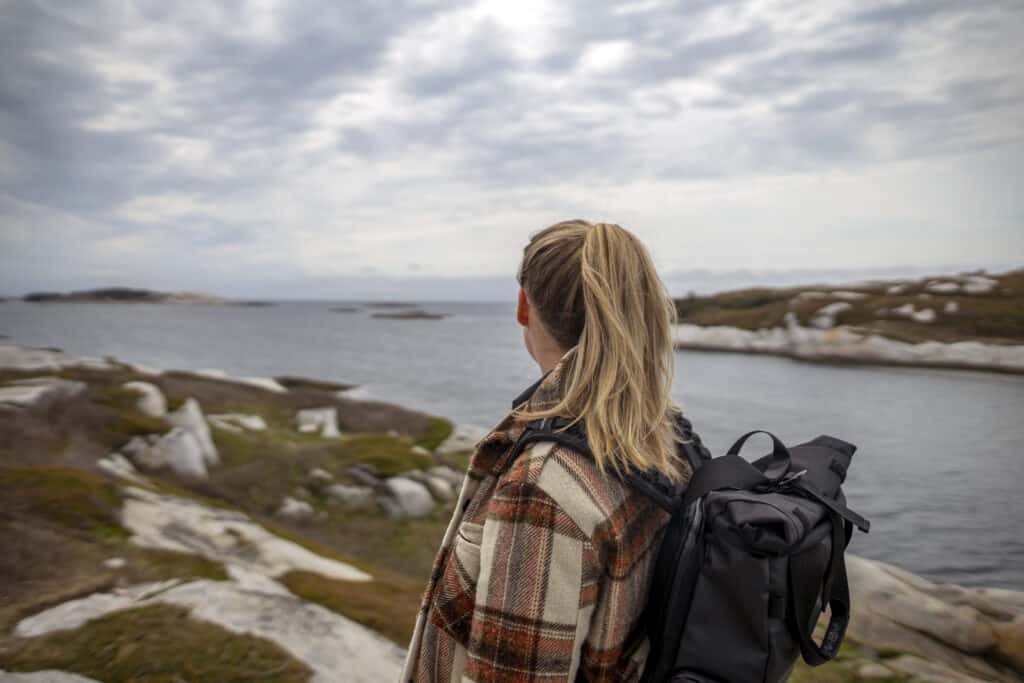
Your Guide to Unpacking Travel Privilege


Shopping Cart
the impact of overtourism and how to combat.
- September 16, 2022

The rise of overtourism
In an ideal world, tourism is supposed to be a win-win situation where locals and travellers both benefit from tourism. Focusing on creating better places to live in, and better places to visit. However, in the past years we’ve seen a rising uproar of destinations that are no longer happy with their situation. The destination attracted more travellers than it can actually sustain and becomes overcrowded. The destination experiences overtourism.
Overtourism represents a situation where both locals as travellers feel the destination is too busy and over-visited. It often loses authenticity for travellers and raises irritation and resistance among locals. Overtourism does not only happen in cities but also occurs in natural areas or around historical sights.
Main impacts of overtourism
At first sight, overtourism might come across as just an inconvenience. Busy and full destinations that many people like to visit. However, if you look further, there are more significant negative impacts caused by overtourism.
“When tourists come in groups, it changes the dynamics and multiplies the effect of tourism”
6 impacts of overtourism
Next, we’ll discuss 6 impacts of overtourism. Use the links below to read about a specific impact.
- Overcrowding
- Isolation of locals
- Water scarcity
- Cultural divide between locals
1. Overcrowding
Some destinations are so busy that they’re overcrowded. Busy shopping streets or historical sites where travellers have to elbow through the mass. It downgrades the experience for the traveller but also ensures that locals can’t access or leave the destination easily.

Archaeological sites are very sensitive for erosion and damage. For example, Machu Picchu in Peru and Petra in Jordan. When too many travellers visit and walk around, the sites may be damaged. The more people are around, the higher the chance the designated paths are ignored. If not regulated and protected, archaeological sites might be damaged in such a way it loses its history and attractiveness.
3. Isolation of locals
Destinations that attract a lot of visitors see an increase in local prices. Mainly caused by the demand-supply of tourism. For example, there is an increased demand for short-term rentals that Airbnb can supply. However, this often results in extremely high rental fees locals can no longer afford. The consequence is that more and more locals leave a destination, with loss of authenticity as result.
4. Pollution
Overtourism highly contributes to pollution in travel destinations. Mainly plastic, such as single-use water bottles and plastic bags. There are many destinations that can’t facilitate sufficient waste separation and recycling. Which means plastic often ends up in nature or is burned. Overtourism also increases the local carbon footprint by travellers flying or driving in the destination.

5. Water scarcity
Even though water scarcity is not a common negative impact of overtourism, it’s becoming more relevant by the day. A growing number of destinations are experiencing issues with water access in (extreme) dry periods. Travellers in a destination use a lot of water, for showers but also swimming pools. When not managed well, it can danger the water access for locals.
6. Cultural divide between locals
The more travellers a destination has, the more authenticity it loses. With an increase in number of visitors, plastic pollution , local prices, and locals leaving the destination, overtourism creates a cultural divide. In the end, travellers visit because they’re looking for a change of scenery and insight in another culture. But overtourism makes the destination lose all authenticity and charm.
Solutions to avoid overtourism
As a tour operator, you don’t have a full and direct influence to actually remove overtourism. However, tour operators do have the opportunity to contribute avoiding overtourism. By adapting their travel experiences and raising awareness among their travellers. Below list provides the most important key solutions for tour operators to avoid overtourism.
7 solutions to overtourism
Next we’ll discuss 7 solutions to avoid overtourism. Use the links below to read about a specific solution.
- Travel off the beaten track
- Explore the alternatives
- Spread the season and reduce demand in high season
- Book local accommodations and guides
- Spend your money locally
- Responsible marketing and education
- Managing carrying capacity

1. Travel off the beaten track
The easiest way to avoid contributing to overtourism is to simply go somewhere else. Don’t stick to the highlights of a destination but travel off the beaten track . Travel to smaller neighbourhoods, country sights and remote local villages. Travelling off the beaten track does not only mean there are fewer other travellers. It also means spreading the impact and benefits of tourism.
2. Explore the alternatives
Very similar to travelling off the beaten track is exploring alternatives. The main difference is staying in the same area but visiting alternative highlights. No longer call on the Top 10 of the highlights. Include city tours that go beyond the touristy areas. Choose biking and hiking trails that avoid the crowds but still offer a similar (and even better) experience in nature. Have your travellers experience the destination in an authentic way.
3. Spread the season and reduce demand in high season
Besides avoiding the highlights and traveling to different places, spreading visitors is effective. By promoting shoulder seasons, you can convince your travellers another time. Not only will the prices be lower in low season , but there will also be fewer other visitors around. The experience might be different but still be amazing! Educate your travellers about overtourism in a transparent way. Convince travellers to avoid crowded tourism highlights.
4. Book local accommodations and guides
One of the negative impacts of overtourism is where locals feel irritation and isolation. They only experience the negative sides of tourism as they don’t really benefit from the travellers. A solution is to book local accommodations (avoid Airbnb) and local guides ! By working with them directly, you’re contributing to local tourism and actual local benefits. When doing this, still make sure to work with those away from the touristic highlights.

5. Spend your money locally
Next to booking local accommodations and guides, there are more ways to support the locals . Encourage your travellers to shop souvenirs from local handcrafters in boutique stores. And to eat and drink in local restaurants and bars. Key is to ensure you’re offering good travel experiences. Where your travellers stay and experience the destination in an authentic way and where they spend their money locally.
6. Responsible marketing and education
As a tour operator, you are in the position to influence the decisions of your travellers. Share information about the destination. It’s customs, its history, and traditions. Explain how your travellers can behave responsibly. Share where they can find the unknown gems, the best local bakery in a hidden alley. Explain how they can make decisions themselves that avoid overtourism and that spreads the impact of tourism.
7. Managing carrying capacity
Even though this is not a direct influence, managing carrying capacity is very important. Governments and city management can limit the number of travellers in a certain destination by taking certain measures. Think about tourist taxes but also ticketing systems. Regulating the maximum number of travellers to protect a destination from crowds. Crowded destinations don’t satisfy anyone and it’s time to take responsibility.
“Tourism growth is not the enemy of overtourism, bad management is” – Dr. Taleb Rifai (former UNWTO Secretary-General)
Start to combat overtourism
The consequences of overtourism are more significant than one might expect. Luckily, as a tour operator you are in a position to contribute to avoiding overtourism. By developing travel experiences off the beaten track and to steer your travellers’ behaviour. If done well, tourism can spread its impact and benefit and satisfy a larger group of locals. Not only those now being newly involved in tourism, but also locals in (now) overcrowded destinations.
Start combatting overtourism by implementing above solutions to avoid overtourism. Contribute to good tourism . Develop local travel experiences that benefit the locals, their economy, the travellers, and the destination itself. Contribute to a future-proof tourism industry.
You must be logged in to post a comment.
One definite solution is to promote low season travel experiences. Many times the attractions are still the same low season or high season, so even if other factors like weather patterns may determine the travel times, visitors can be advised to travel a little earlier or latter to have a better experience.
Yes absolutely Adam. How do you make low season attractive for your target group?
Anne de Jong

Roadmap to sustainable travel success (free Ebook)
Discover 6 proven paths to best-selling sustainable travel experiences.
Download free roadmap
Read our latest library additions

How to communicate sustainability effectively

How to integrate sustainability across your website

Understanding Gen Z travel needs and demands


- Embedded System
- Interview Q
- Send your Feedback to [email protected]
Help Others, Please Share

Learn Latest Tutorials
Transact-SQL
Reinforcement Learning
R Programming
React Native
Python Design Patterns
Python Pillow
Python Turtle
Preparation

Verbal Ability

Interview Questions

Company Questions
Trending Technologies
Artificial Intelligence
Cloud Computing
Data Science
Machine Learning
B.Tech / MCA
Data Structures
Operating System
Computer Network
Compiler Design
Computer Organization
Discrete Mathematics
Ethical Hacking
Computer Graphics
Software Engineering
Web Technology
Cyber Security
C Programming
Control System
Data Mining
Data Warehouse

Space tourism: What are the pros and cons?
Space tourism has its fans — and its critics.
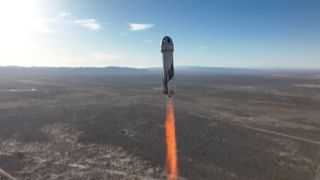
Private companies are offering many opportunities to make the leap off Earth , ranging from a quick suborbital hop to a multi month stay on the International Space Station (ISS). But the advent of the space tourism industry has spurred a vigorous debate: Is it helping to propel humanity to the stars , or is it just letting rich people have a little fun while providing no real value?
Here's a look at the pros and cons of space tourism.
Related: How SpaceShipOne's historic launch 20 years ago paved the way for a new space tourism era
The pros of space tourism
A handful of private individuals, colloquially known as space tourists, managed to purchase tickets to the ISS or Russia's Mir station. However, with the end of the space shuttle program in 2011, NASA canceled any further opportunities. That picture changed with the emergence of private spaceflight companies headed by various billionaires, including Elon Musk's SpaceX , Jeff Bezos' Blue Origin and Richard Branson's Virgin Galactic .
Of the three, only Virgin Galactic has a stated long-term goal of promoting space tourism, offering quick suborbital flights just above the Kármán line — the arbitrary but internationally recognized edge of space. Paying customers can get a similar experience with Blue Origin, but that company hopes to pivot to orbital industries. With SpaceX, you can get a multiday stay in orbit, but you'll have to bid against numerous government contracts for the opportunity.

Promoters of space tourism have suggested various benefits of the industry. For example, many space tourists are actively running and participating in experiments, such as examining the effects of microgravity on human health , plant growth and material properties. This is real science that needs to be done to propel humanity to the stars.
There's also financial propulsion, with hundreds of millions of dollars of investment going into the newfound industry. Companies are developing new equipment, techniques, technologies and more so they can offer tickets to space. And the more we invest in space in general, the better off our shared ventures will be.
Get the Space.com Newsletter
Breaking space news, the latest updates on rocket launches, skywatching events and more!
The frequent launches of space tourists, including celebrities such as William Shatner , have caught the media by storm. This, in turn, fuels more public interest, which can lead to more discussion, more awareness and more funding.
The cons of space tourism
On the other hand, critics of space tourism point out that the industry is catering solely to exceptionally wealthy individuals. Ironically, this can lead to a sense of public disillusionment with space: Instead of opening it up to everyone, it might cause people to roll their eyes at the inaccessibility. Basically, it's just rich people doing rich-people things.
Because of the enormous cost of a ticket — anywhere from hundreds of thousands to tens of millions of dollars — it's hard for most people to see the value in space tourism as an industry. They simply don't get to participate in it.
And while some space tourists have conducted experiments during their expeditions, those experiments haven't exactly been revolutionary or consisted of anything that couldn't be done by astronauts on the ISS. So space tourism isn't really advancing human spaceflight in any significant way.
Lastly, space tourism is a niche business. While some companies have developed technologies that are specific to this industry, those technologies will not necessarily transfer to other space-related activities, like industrial or scientific applications. We could be spending all this time, money and resources on a business venture that never grows significantly and never leads to anything else.

The bottom line
The bottom line is that space is hard — it's difficult to get to space, and it's difficult for humans to remain in space for any length of time. Most space tourism companies have folded well before their first attempted launch, and it's not clear that this business niche will grow all that much. Only roughly 60 people have been to space as tourists, and the vast majority of them have gone only on quick suborbital joyrides with a few minutes of weightlessness.
There are only a few launches, at most, every year dedicated to space tourism, and a peek at planned launch schedules reveals that this number will not change much over the coming years.
— Do space tourists really understand the risk they're taking?
— The rise of space tourism could affect Earth's climate in unforeseen ways, scientists worry
— Most Americans expect routine space tourism by 2073, but few would actually try it
Most people will never get the opportunity to become a space tourist; it will likely remain a niche industry serving a select set of very wealthy individuals. It's not a game changer in any direction. It will continue to be a component of the overall human interest in space but not a major driver of innovation or expansion.
But hey, if you're ever given the chance, go for it!
Join our Space Forums to keep talking space on the latest missions, night sky and more! And if you have a news tip, correction or comment, let us know at: [email protected].
Paul M. Sutter is an astrophysicist at SUNY Stony Brook and the Flatiron Institute in New York City. Paul received his PhD in Physics from the University of Illinois at Urbana-Champaign in 2011, and spent three years at the Paris Institute of Astrophysics, followed by a research fellowship in Trieste, Italy, His research focuses on many diverse topics, from the emptiest regions of the universe to the earliest moments of the Big Bang to the hunt for the first stars. As an "Agent to the Stars," Paul has passionately engaged the public in science outreach for several years. He is the host of the popular "Ask a Spaceman!" podcast, author of "Your Place in the Universe" and "How to Die in Space" and he frequently appears on TV — including on The Weather Channel, for which he serves as Official Space Specialist.
NASA Inspector General issues harsh report on delayed SLS mobile launcher project
Trump says he'd create a Space National Guard if elected
New record: Blue Origin launches youngest woman beyond Kármán line
- GregB03 In its early days aviation was something that only the rich could afford to do. It took a while for it to reach prices that were affordable to the general population . It's early days for commercial space travel. Reply
GregB03 said: In its early days aviation was something that only the rich could afford to do. It took a while for it to reach prices that were affordable to the general population . It's early days for commercial space travel.
Osbert said: If these people were going someplace, I might agree with you but UP and then free-falling, is not a "destination". It's not a destination if you arrive, basically where you started from. Let's start launching people UP and over/out too actually land some place >> because they wanted to get to that/some place. Also, UP and freefall is not space travel. Far from it, lol. It's a fair/carnival ride - period. Nothing but an uncontrollable joy-ride in a tin-can - WEEeeeeeeeeeeeeeeeeeeee!!!!
- View All 3 Comments
Most Popular
- 2 Private astronauts of Polaris Dawn mission patiently await SpaceX launch amid multiple delays
- 3 Netflix's 'Terminator Zero' restores faith in an ailing sci-fi franchise (review)
- 4 SETI searches for alien life in over 1,000 galaxies using unexplored radio frequencies
- 5 NASA Inspector General issues harsh report on delayed SLS mobile launcher project

COMMENTS
The Advantages. For developing countries, the advantages of tourism tend to be primarily monetary. A large scale tourism industry prevents larger, more harmful businesses from working off the land. Small tourist companies that reign on the land stops large capitalistic corporations from polluting the air or gentrifying people's homes.
The importance of tourism is demonstrated throughout the world. From the economic advantages that tourism brings to host communities to the enjoyment that tourism brings to the tourists themselves, there is no disputing the value of this industry. The importance of tourism can be viewed from two perspectives: the tourism industry and the tourist.
Advantages of Tourism. Tourism is a huge industry. It not only creates jobs, but also fosters economic development in different areas of the world. It has many advantages such as boosting the economy and giving the destination a sense of place. Tourism also helps preserve natural resources and cultural traditions.
Advantages of Tourism. Economic benefits: One of the most significant advantages of tourism is the economic benefits it provides. Tourism generates income for local businesses and creates job opportunities for people in the host community. It also boosts the local economy by increasing the demand for goods and services.
The contribution of tourism to economic well-being depends on the quality and the revenues of the tourism offer. UN Tourism assists destinations in their sustainable positioning in ever more complex national and international markets. As the UN agency dedicated to tourism, UN Tourism points out that particularly developing countries ...
2. The Progression of a Country. As wealth influx starts in the country, it helps the government to procure necessary funds for development and progression of the country. The tourism sector gives security and stability to the economy of the nation, preventing it from tanking in times of crisis.
The tourism industry showed an unbridled growth from a mere 500,000 international travellers just after World War II, to more than one billion international arrivals each year just before the virus shut down travel globally. This amount of growth led to a focus of profits over people, in which multinational companies profited from the ...
The Pros of Tourism. From stimulating job growth to bridging cultural divides, tourism has many benefits for people, the economy and the environment. Below are five advantages of tourism. 1. Creates Jobs. One of the most significant benefits of tourism is creating jobs for people who may have previously been unemployed.
Tourism is growing, and growing fast. After surpassing 1 billion international visitors in 2012, we are expecting 1.8 billion by 2030. Tourism is growing faster than the global economy and, for the first time, the statistics for 2015 are expected to show that there were more trips taken to the developing world than to the developed world.
tourism, the act and process of spending time away from home in pursuit of recreation, relaxation, and pleasure, while making use of the commercial provision of services.As such, tourism is a product of modern social arrangements, beginning in western Europe in the 17th century, although it has antecedents in Classical antiquity.. Tourism is distinguished from exploration in that tourists ...
How Tourism Benefits Nature and Wildlife. The Great Barrier Reef. Yellowstone. The Amazon Rainforest. One of the top reasons that tourists are drawn to destinations such as these is because of their rich biodiversity and unique landscapes. According to Brand USA, 2 of the top 5 motivators for selecting vacation spots are ecotourism and nature.
Tourism is the act of traveling for leisure, recreation, or business purposes. It involves the movement of people to destinations outside their usual environment for a certain period of time. The purpose of this article is to examine the advantages and disadvantages of tourism, with a focus on its economic, cultural, and social effects.
The United Nations Conference on Trade and Development (UNCTAD) estimates that tourism's woes will cause global GDP to decline by as much as 1.5 per cent to 2.8 per cent. Furthermore, the fall ...
Conclusion. There are both advantages and disadvantages to tourism. On the plus side, tourism can have both a favorable impact on the economy and drawbacks. Because of this, it's crucial to manage tourism operations responsibly and sustainably through careful planning, community involvement, and the implementation of sustainable tourism ...
Getting away from home and stepping outside of your usual routine is beneficial for both mind and body. The long-lasting personal benefits of visiting a foreign country far outweigh the costs and time to get there. The great travel writer Pico Lyer said: "Travel is not really about leaving our homes, but leaving our habits."
One of the significant advantages of tourism is that it can help protect and preserve the environment. Local governments can invest the revenue generated by tourism for the betterment of environmentally sensitive regions and areas with fragile ecosystems. 4. Improved Infrastructure is Among the Pros of Tourism.
Abstract. This study investigates the determinants of competitive advantages in tourism services for the EU-28 countries over the period 2000-2013. After having extended the Balassa methodology to measure competitive advantages, a dynamic panel data model is implemented to explain their drivers. The econometric analysis indicates that ...
Developing tourism that capitalizes on the location's inherent advantages while preserving and improving the features and experiences of existing tourism resources. 5. Consultative: ... Decentralized Tourism Planning: Organizations are interested in developing tourist spots and planning the various activities visitors can enjoy. (Joint Venture).
Tourism has incentivized better tourism infrastructure and protected natural areas in Iceland. 2. Stimulates Economic Growth. One of the biggest pros of tourism is economic. Tourism accounts for about 10% of employment worldwide, both directly and indirectly. Benefits can extend to a local economy, and broader, country-wide economy as well.
4. Book local accommodations and guides. One of the negative impacts of overtourism is where locals feel irritation and isolation. They only experience the negative sides of tourism as they don't really benefit from the travellers. A solution is to book local accommodations (avoid Airbnb) and local guides!
In tourism research, social constructionism started to develop in the 1990s and has become one of the dominant approaches among qualitative methodologies in the recent years. Paradoxically, social constructionism, which is based on the pluralism of perspectives, can also be used as a tool to maintain an advantage.
Disadvantages of Tourism. 1. Tourists' Negligence of the Environment. When it comes to tourism, thousands or even millions of people may travel somewhere. Particularly in places where tourists are more likely to travel, this high tourist influx has the potential to cause significant environmental damage.
Tourist has a wide variety of transport options available today. There are several advantages and disadvantages of all the model of transport. These are following as: Air Transport. Direct root, high speed, quick service, social and political significance, luxurious travel are the advantages of air transportation.
Tourism is crucial to the country's service economy, increasing foreign exchange earnings, creating job opportunities, increasing funds, and attracting investments (Comerio & Strozzi, 2019).Among others, wellness tourism has grown in popularity and is augmenting the global market due to increasing interest in healthy lifestyles (Dillette et al., 2021).
Understanding the factors that contribute to tourism competitiveness in developing economies is essential for policymakers, industry stakeholders, and researchers, as these countries still struggle to fully capitalize on their tourism potential. The residents' perspective, often overlooked in Tourism Destination Competitiveness (TDC) models, is crucial because they are the primary ...
Commuters are encouraged to take advantage of the free fare week to explore various destinations across the region. Here are a few places you can consider visiting: Liberty State Park.
The pros of space tourism. A handful of private individuals, colloquially known as space tourists, managed to purchase tickets to the ISS or Russia's Mir station.
Taking advantage of the US's Visa Waiver Program. District Attorney Summer Stephan said some countries enrolled in the Visa Waiver Program are using it for crime tourism. "That's supposed to ...
Alberta has temporarily waived work experience requirements for some applicants in the Alberta Advantage Immigration Program (AAIP).. The temporary waiving of the need for specific work experience in the Alberta Opportunity and Tourism and Hospitality Streams of the AAIP aims to allow workers whose current employment is affected by the wildfires to find new work as soon as possible.